It's been almost 2 months now - time to bring the second Tour de France online. Maik (and occasionally Axel) were mostly travelling in the south. However, there were also short detours to Rennes & Paris.
The destination of the exploration tour: FabLabs and open workshops that do or have done projects with people with disabilities. Here is an overview map of the trip:
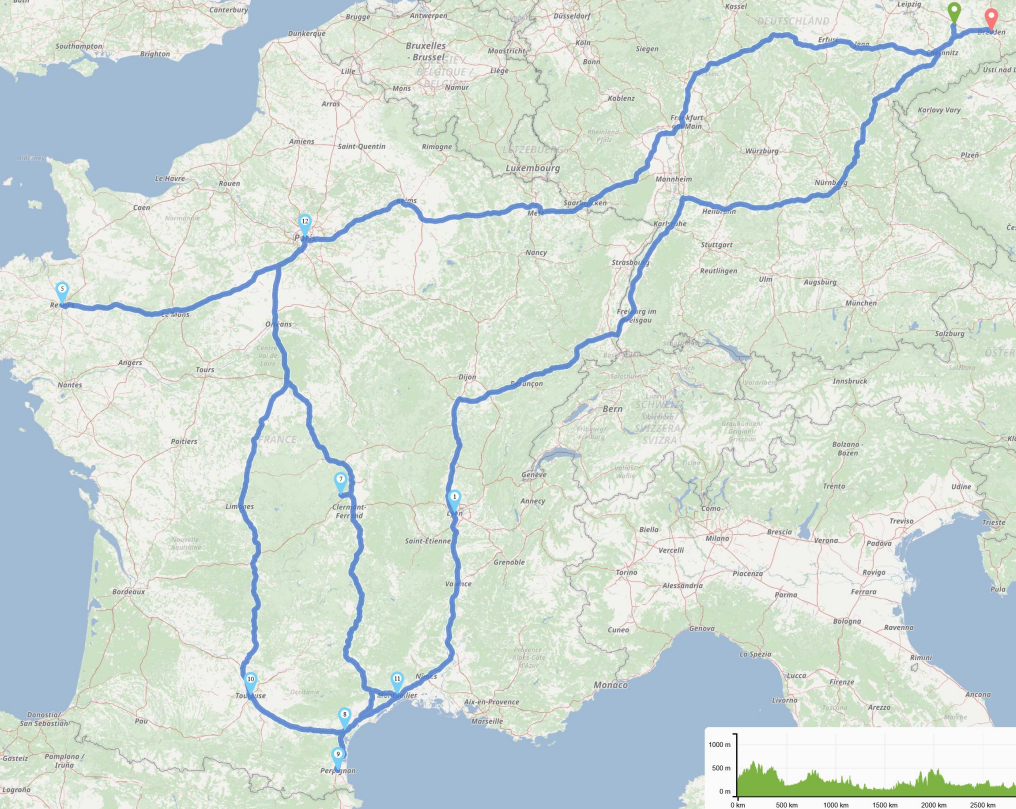
Stop 1: TactiLab (la Miete) / Lyon
The focus of TactiLab, as you might have guessed from the name: Projects with blind people. However, children with mental disabilities or AHDS also find a quiet and well-supervised environment for working and tinkering here. The Fablab is visited and built every Wednesday (when primary school is closed in France). Often, small groups of children accompanied by their carers come here regularly every week for several months.
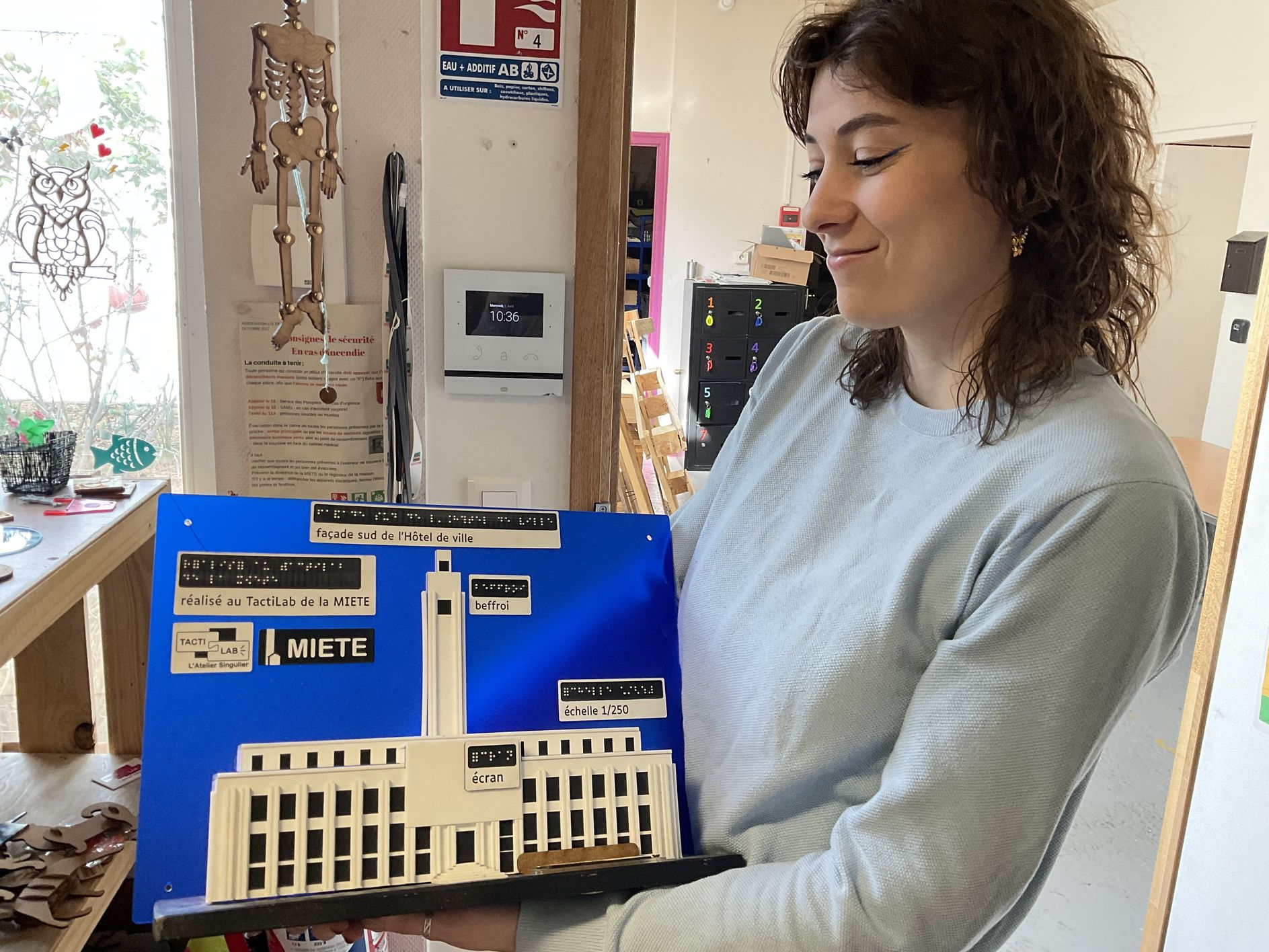
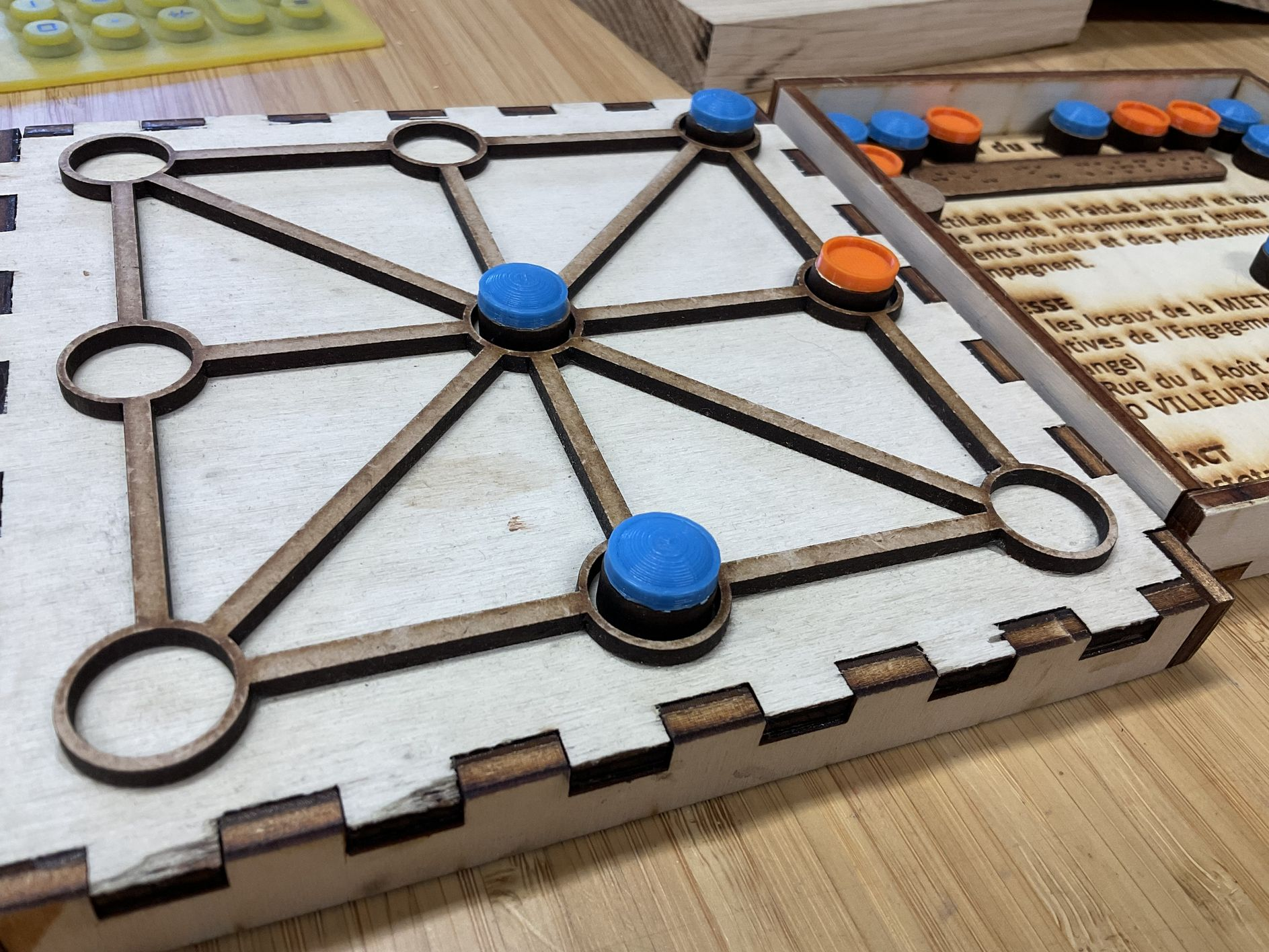

But the workshop is also geared towards participation in other areas

Unnecessary buttons taped off and colour-coded to make access easier.
The TactiLab is located in Villeurbane as part of what we would call a socio-cultural or district centre, LaMiete. In addition to lasers and 3D printing, the centre also offers woodworking and ceramics, a sports room next door and many other opportunities to get together.

Stop 2: AutonaBee / Lyon
Also in Lyon and also part of a district centre - that's AutonaBee. The project is the result of a collaboration with hospitals and rehabilitation centres. It started with courses on digitalisation in hospitals and rehabilitation facilities. After many years of work in this field, it is now widely recognised and runs various digital (further) education projects in and around Lyon, mostly funded by the city/region. AutonaBee is also part of the Human Lab network. The lab recently relocated. It is now more central and more accessible (metro on the doorstep and also barrier-free building).
Two blind people are also active in the lab itself, although they are not (yet able to) do anything else in the lab (e.g. on the 3D printer). Then there are also makers in wheelchairs, who are actively involved and in the new location the lab is finally accessible for them too thanks to the lift! There are mainly co-creation workshops with and for people with disabilities.
The starting point 4 years ago was a project with people with intellectual disabilities and 3D printing. Open source is always an issue: here too, these instructions for TinkerCAD in easy/simple language (see photo).
The focus of the lab and the people I was able to meet there is on direct support with concrete solutions, e.g. from the 3D printer. There is also a ‘problem collection box’. The format is called FabBeDo and takes place twice a month, in the evenings between 6 and 9 p.m. Makers are invited to discuss the problems and look for ideas for solutions together with those affected. Enquiries are also sometimes sent by email.
Those ‘affected’ are also required to coordinate their projects themselves, i.e. not just to wait for help, but to guide the volunteers and to lead the project (their project) accordingly, in their favour and, as far as possible, to participate.
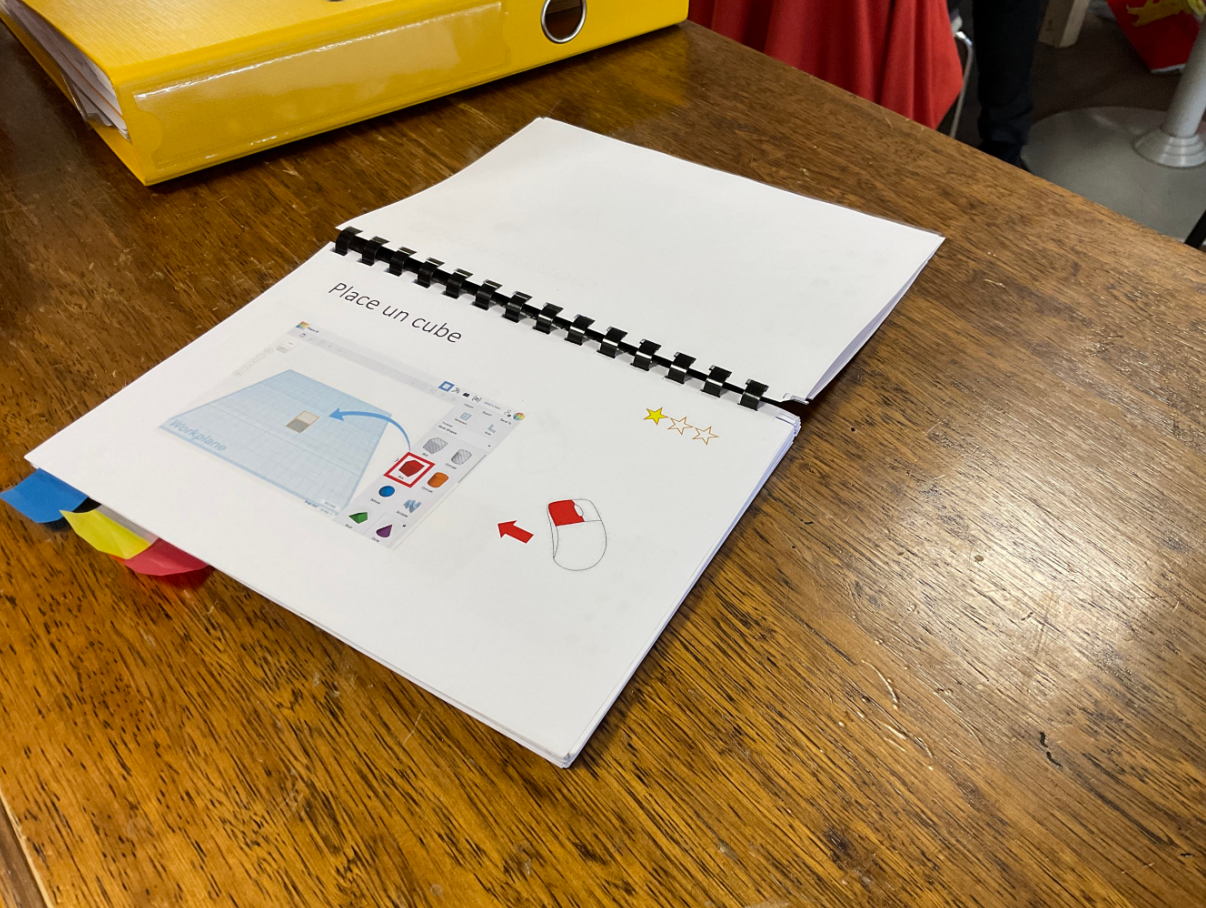
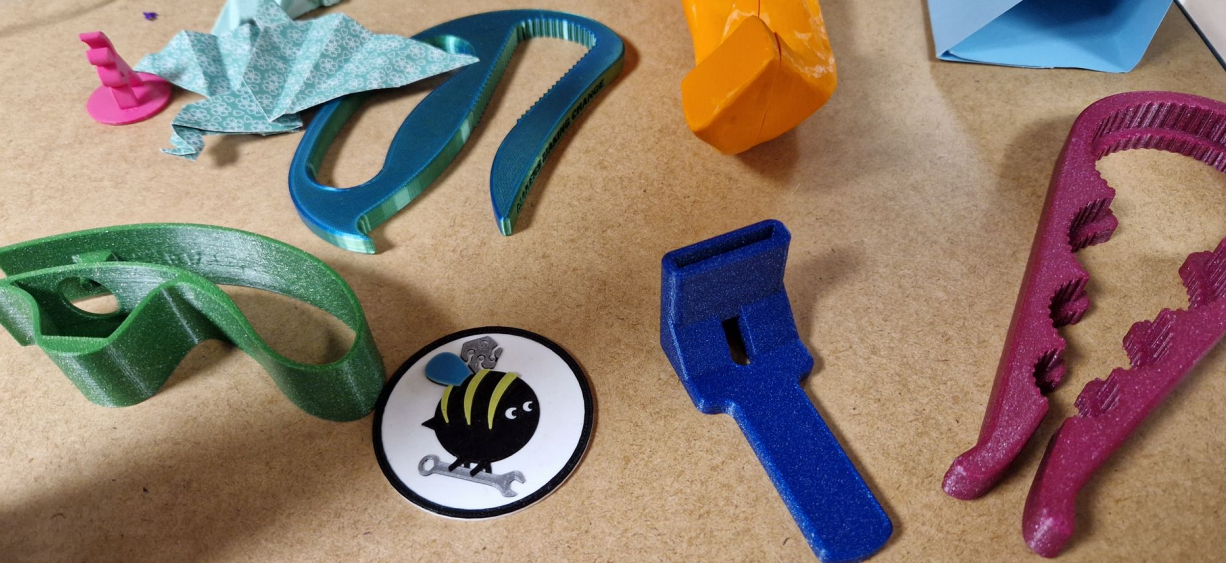
personalised adapter for a hand scythe (sic!) and much more
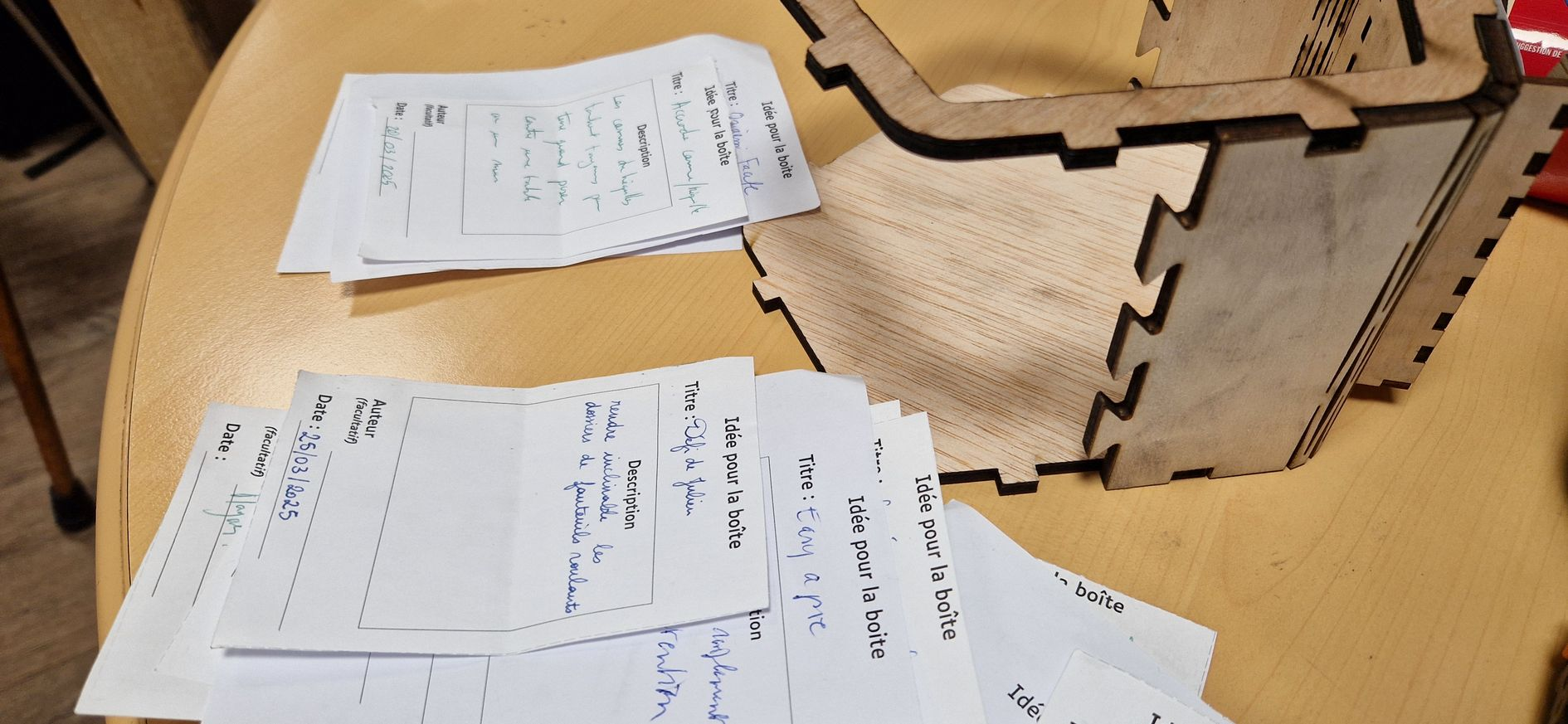
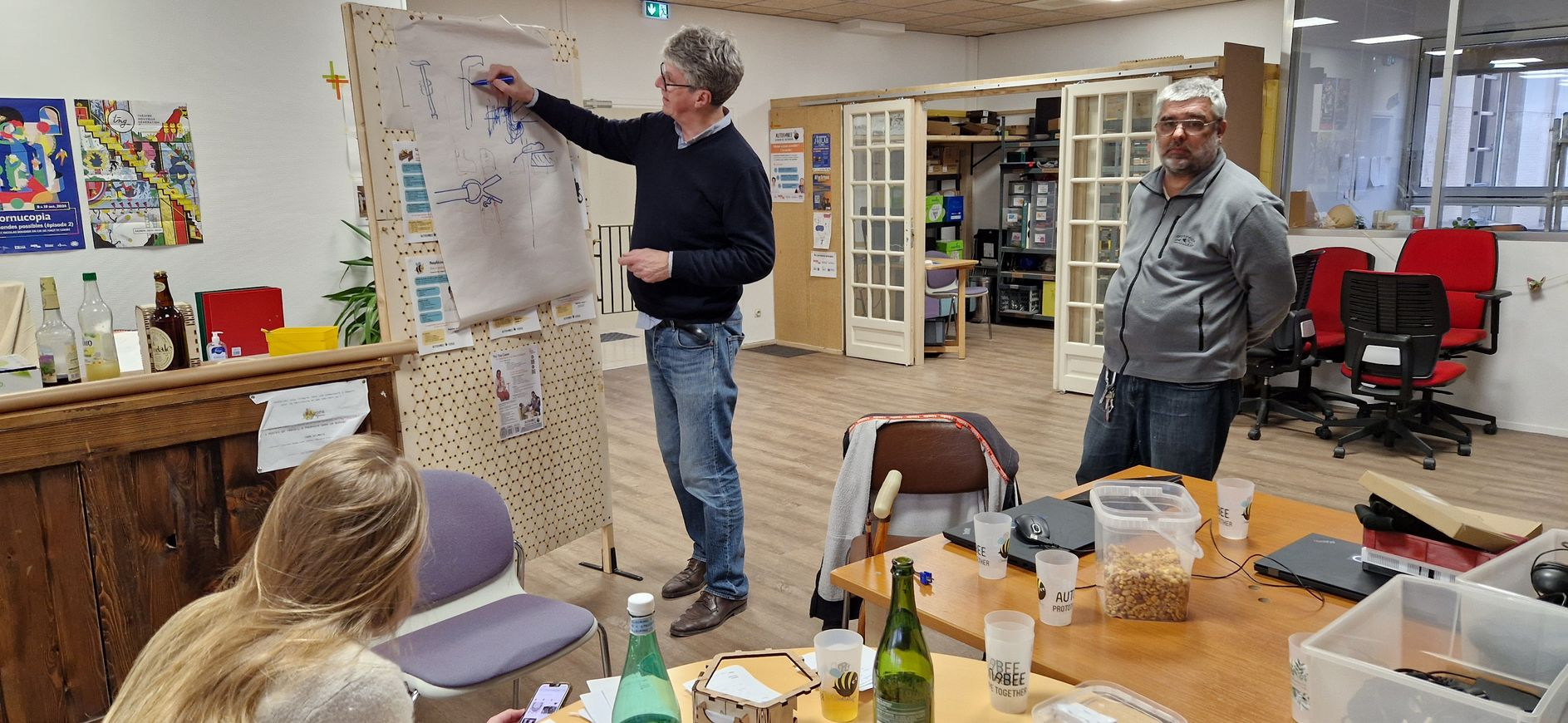
Evening at AutonaBee: Volunteer tinkerers at work. Unfortunately without members of the target group present
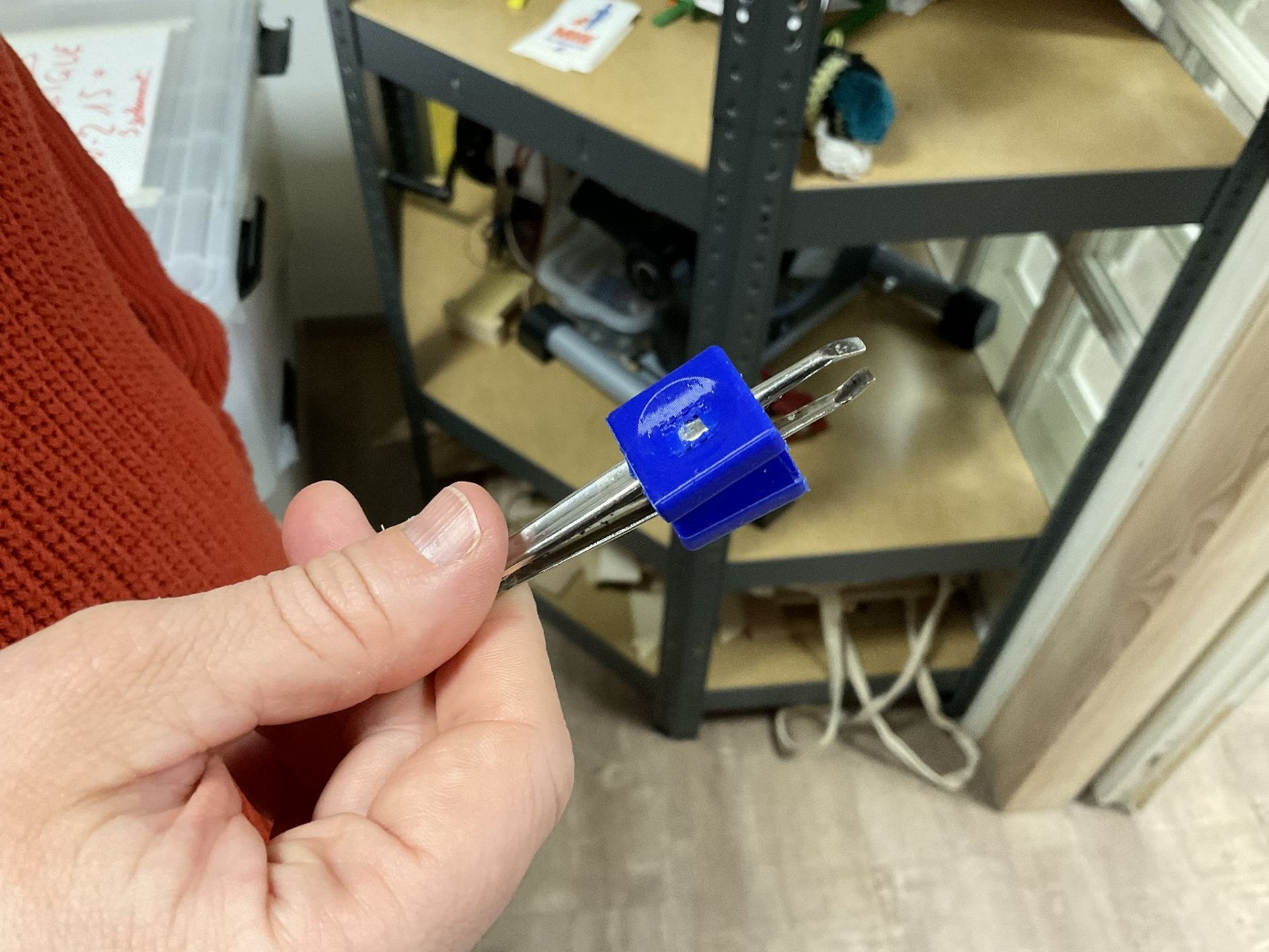
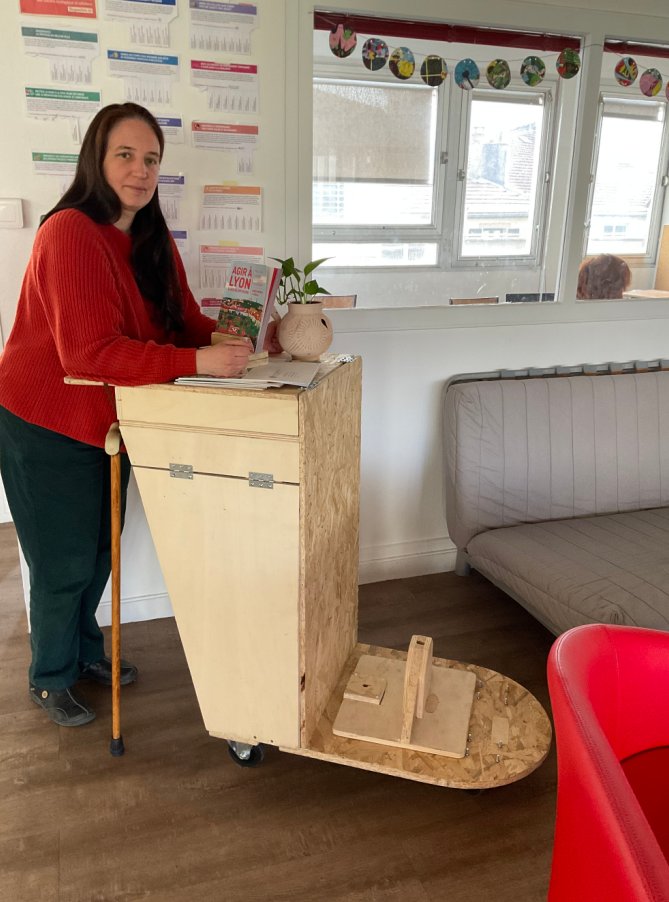
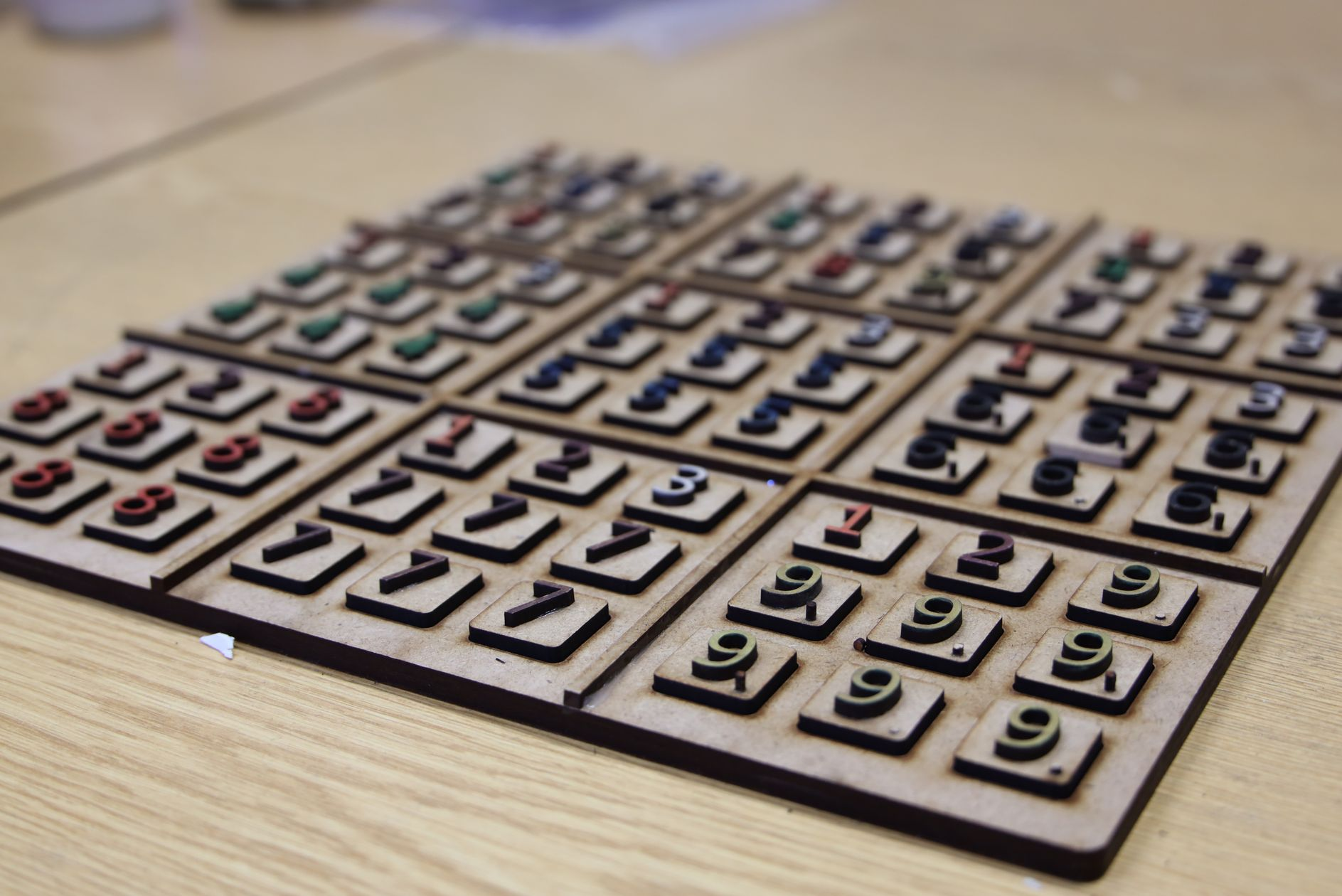
Further examples of tools produced in the labs
And before I leave Lyon, I still have to lend a hand. Workshop preparations: Taking apart old pallets. Over the next few days, young people will use the leftover wood to build smart street furniture… DIY, sustainability, recycling & self-empowerment in a prefabricated housing estate:
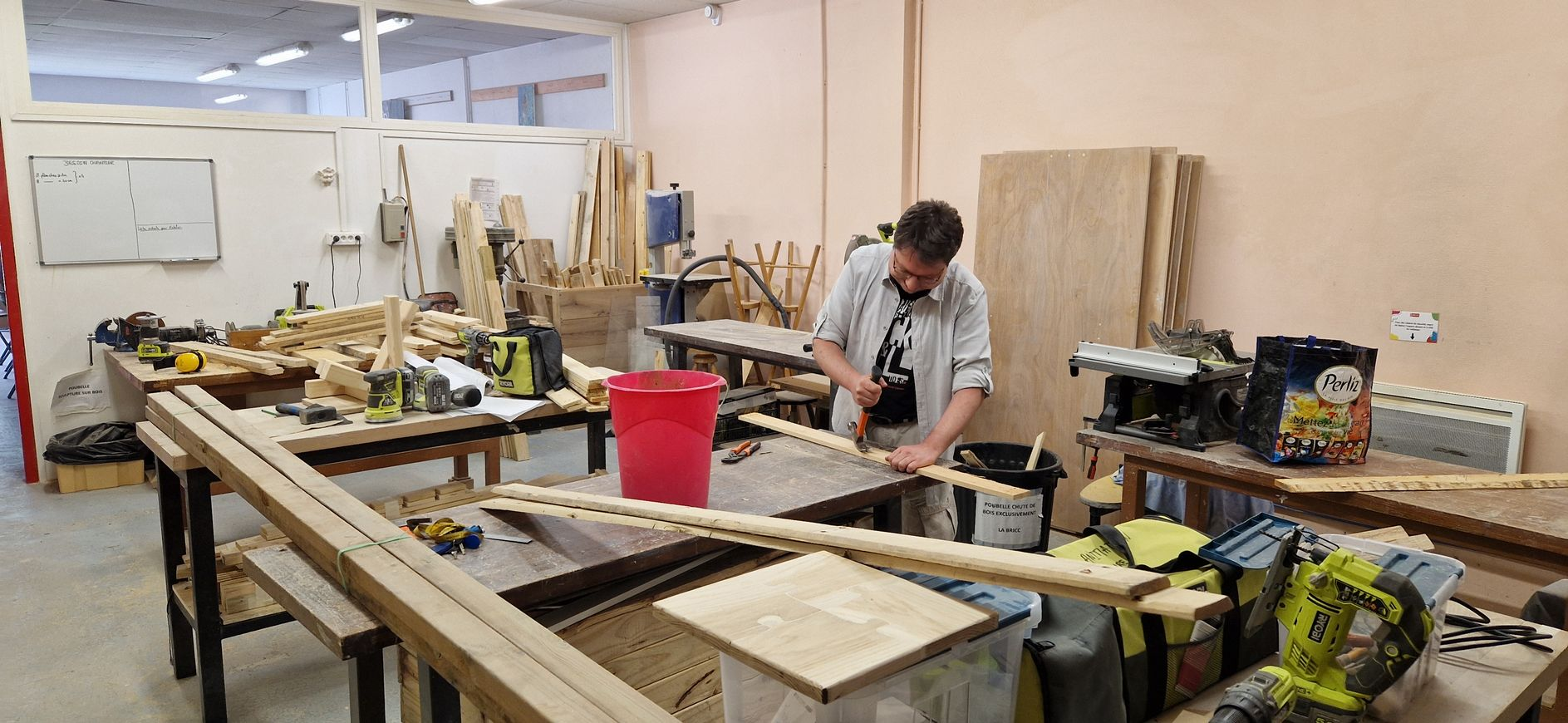
On the way to Perpignan
A short hop: we're travelling to Perpignan by TGV. There's a hackathon this weekend. Once a year in Cabestany, the labs from Perpignan and the surrounding area (FabLab 66, La Cyber Fabrique & Hospital) come together to build and tinker with solutions for people with disabilities. On Fridays, children (with intellectual disabilities) were also there. They were introduced to the topic and captured it in pictures. The aim of the hackathon was to come up with solutions together - for what are often actually simple things: atomising perfume or a walking stick with (magnetic) help for picking things up (if there are physical limitations), a suitable mobile phone holder for a wheelchair, etc.
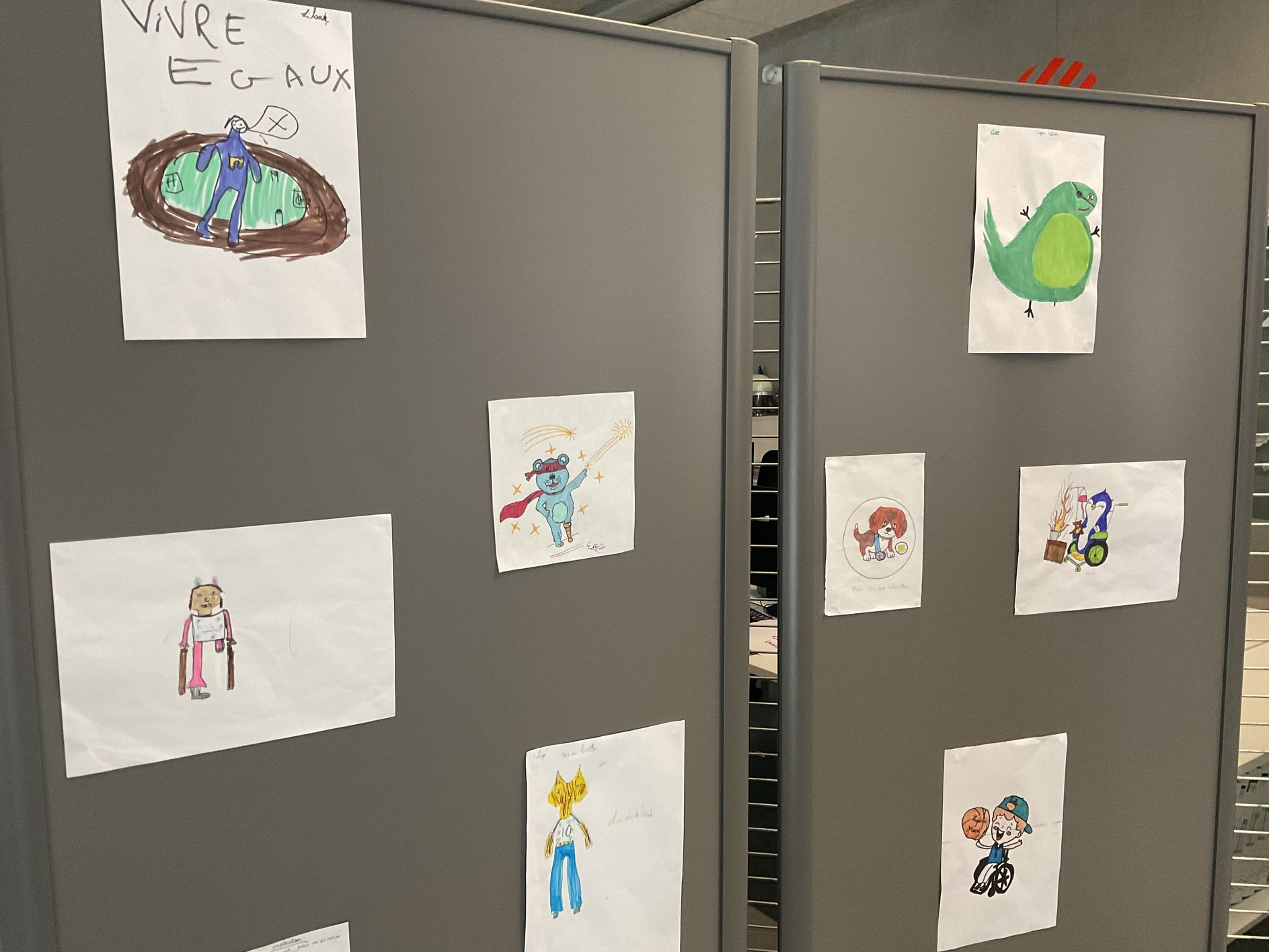
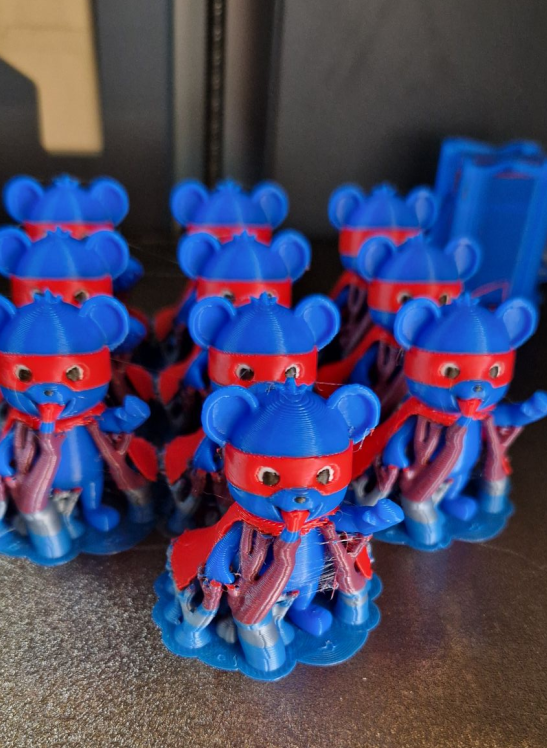
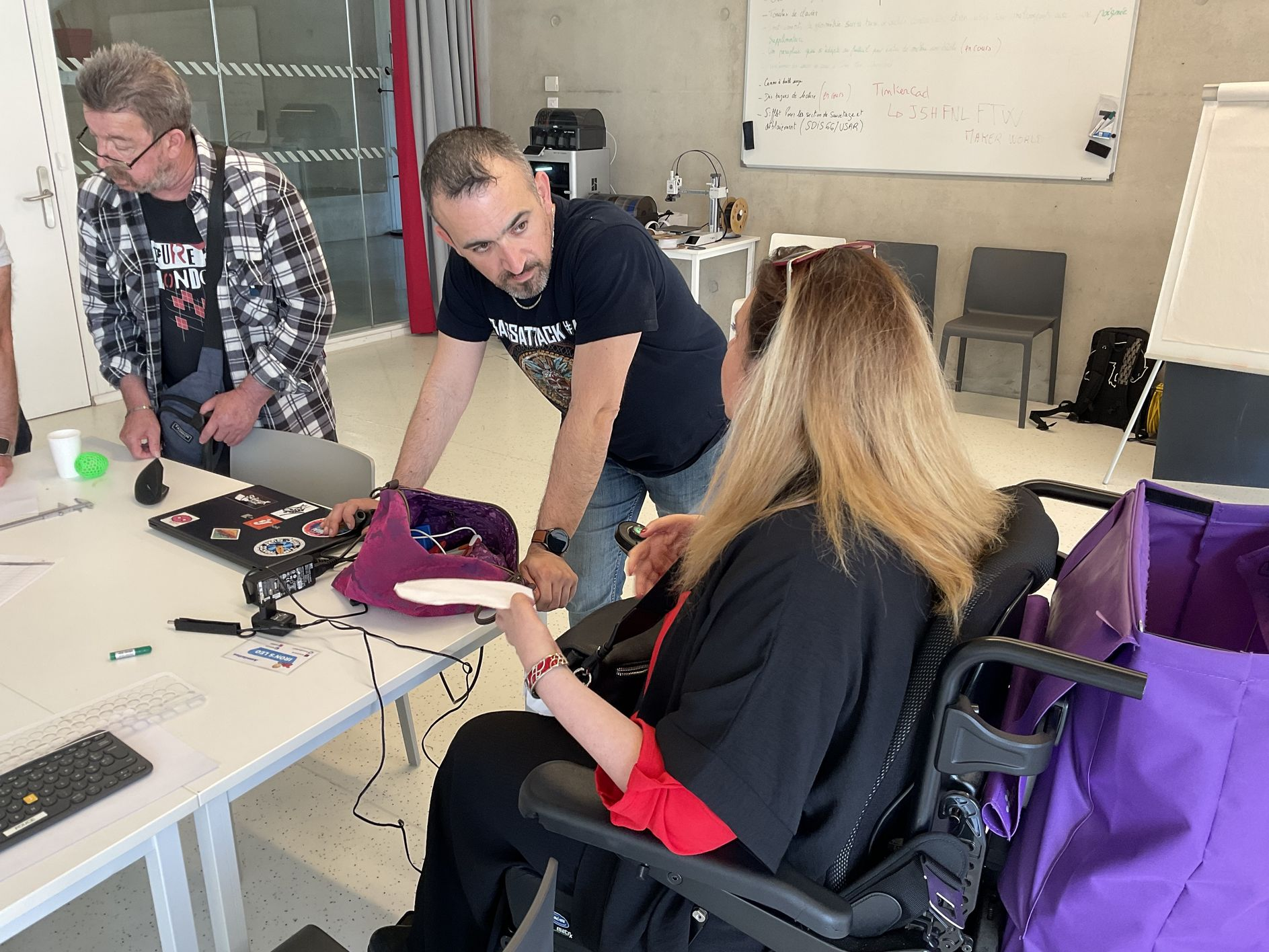
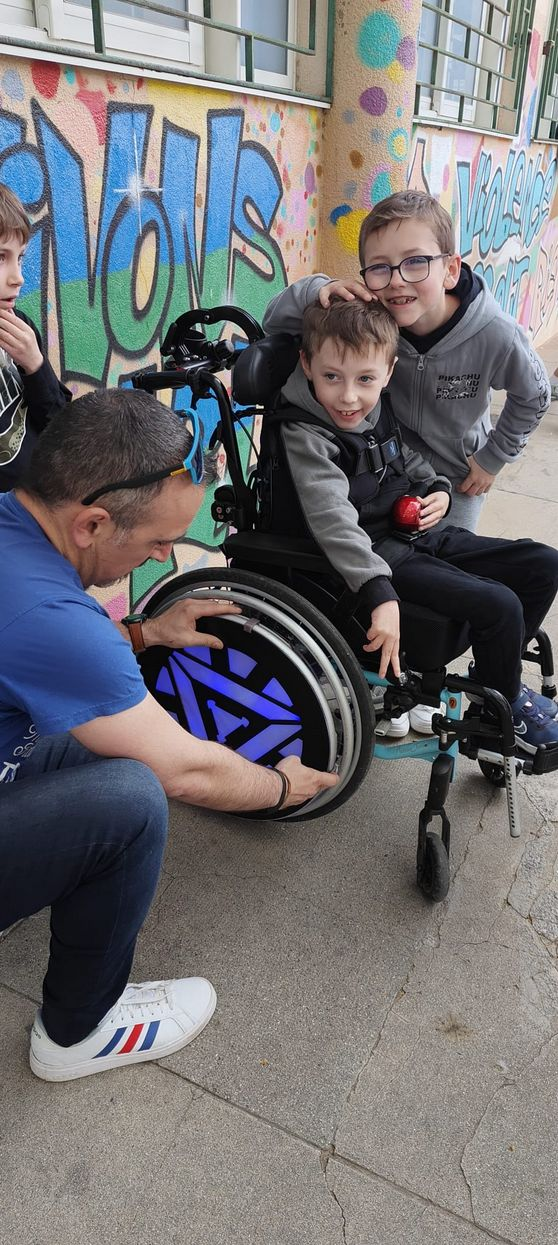
My highlight of the hackathon: an LED tuning for a wheelchair from a young IronMan fan
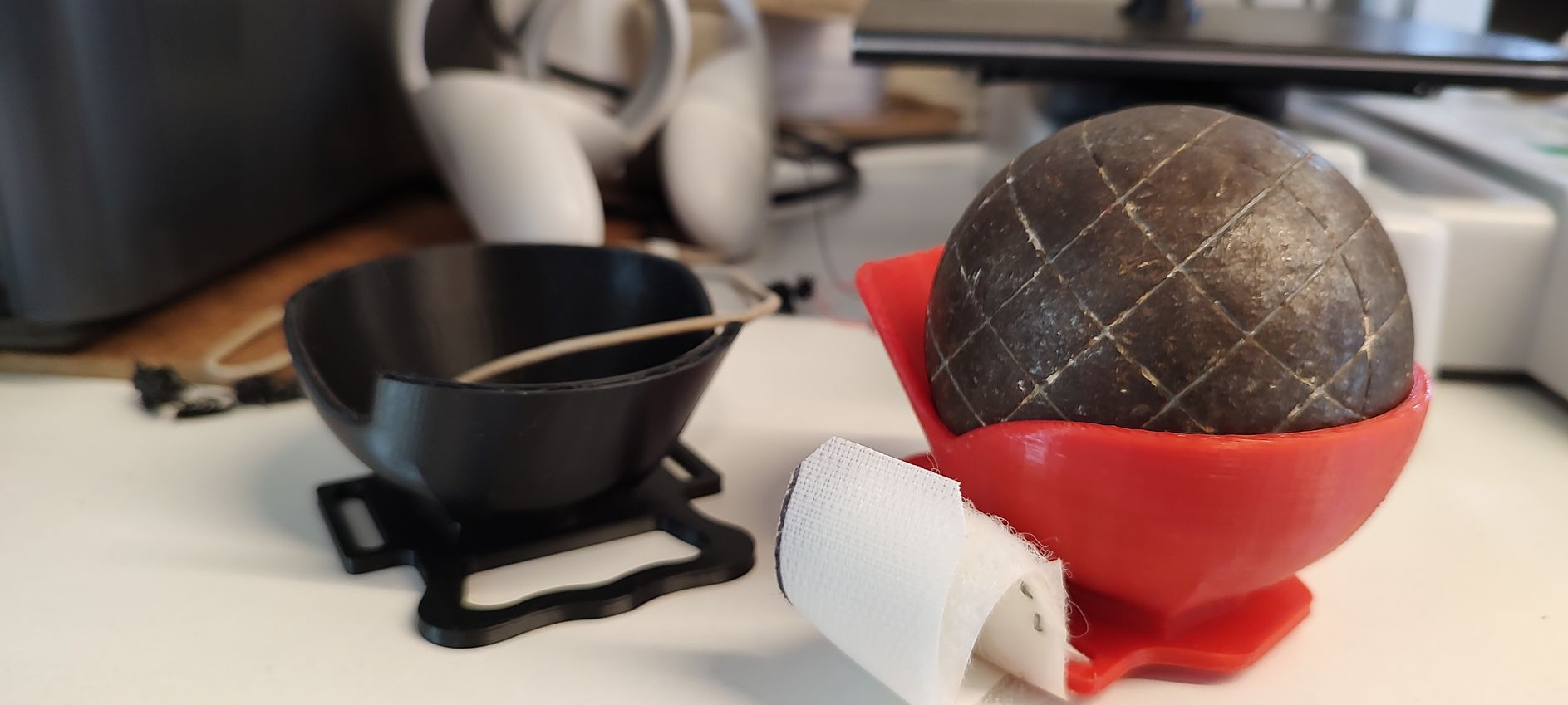
Jump to the north (Rennes)
Due to one of the largest and most widespread inclusive projects, ‘My Human Kit’, I really wanted to take a look at it and get to know its founders, so I ‘hopped’ from the south to the north-west. One stop was right on the way: the UniLab bzw. EduLab Rennes 2 in the north of Rennes.
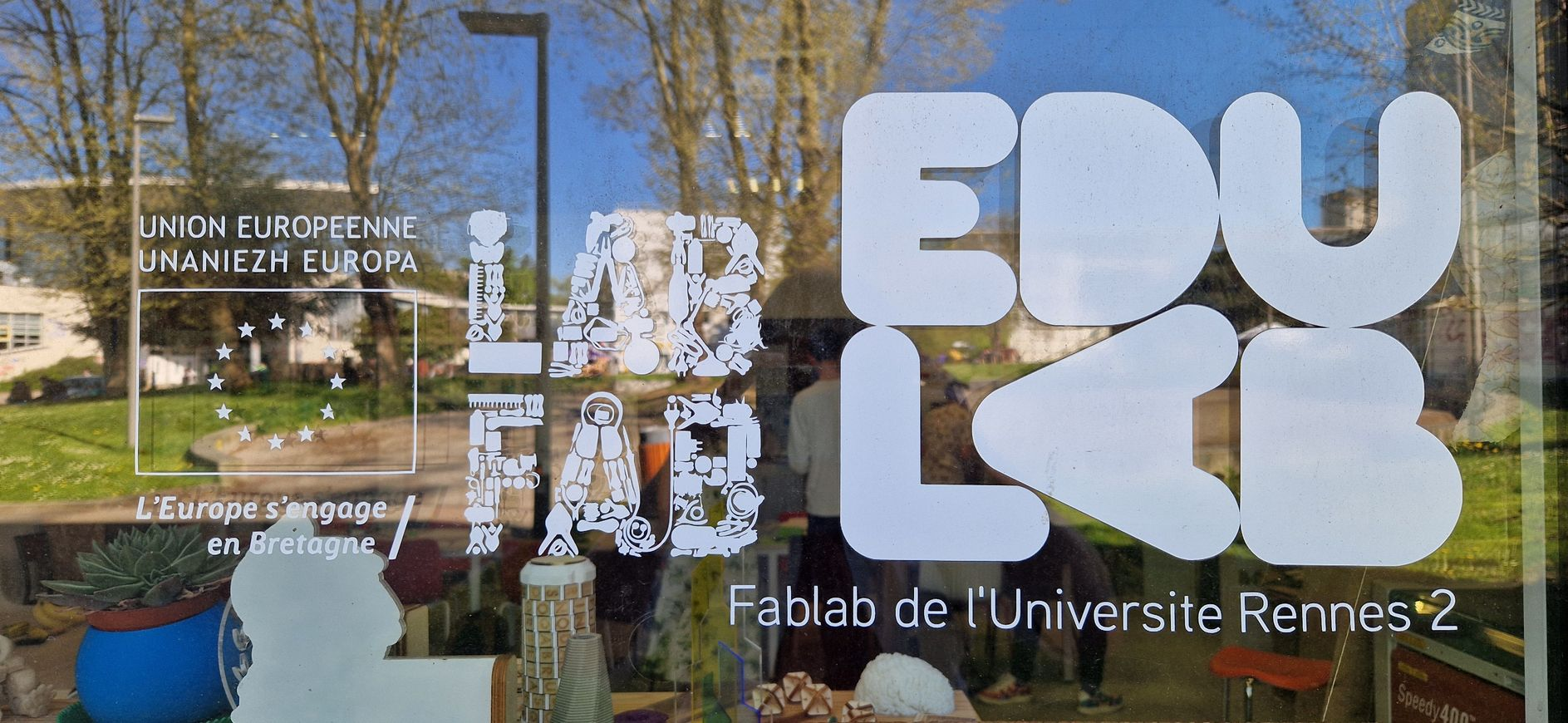
Like Babette & Mario, I was also able to make a short stop at the BrailleRap developers in Janzé, a suburb of Rennes. Graphics, text, photos - many things can be displayed or converted for tactile perception. The following photo shows an ultrasound image of a baby as an example. The font and text are familiar. What's new here is that you can build the machine yourself, like the first 3D printers 10 years ago, and the software is also free and you can then adapt the Braille principle yourself for a wide range of applications.
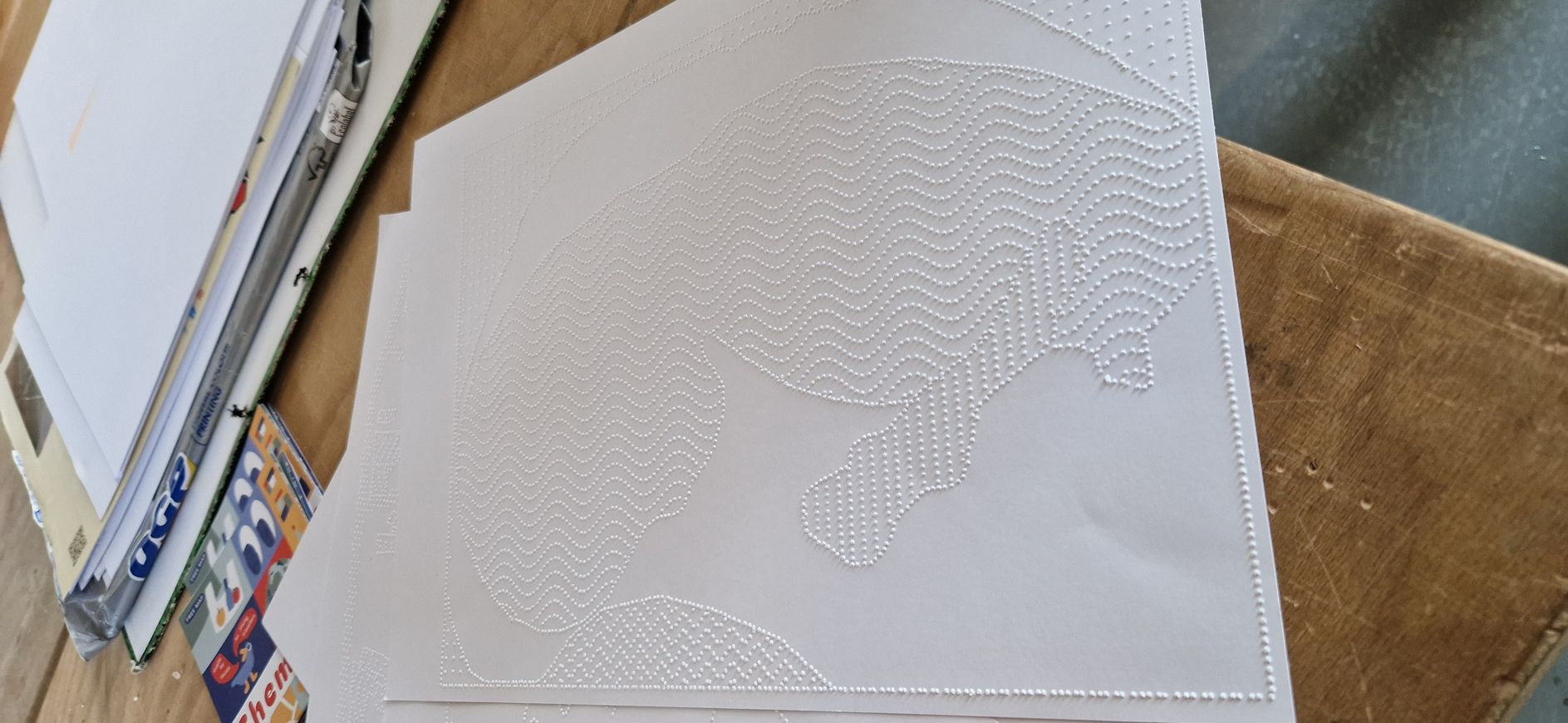
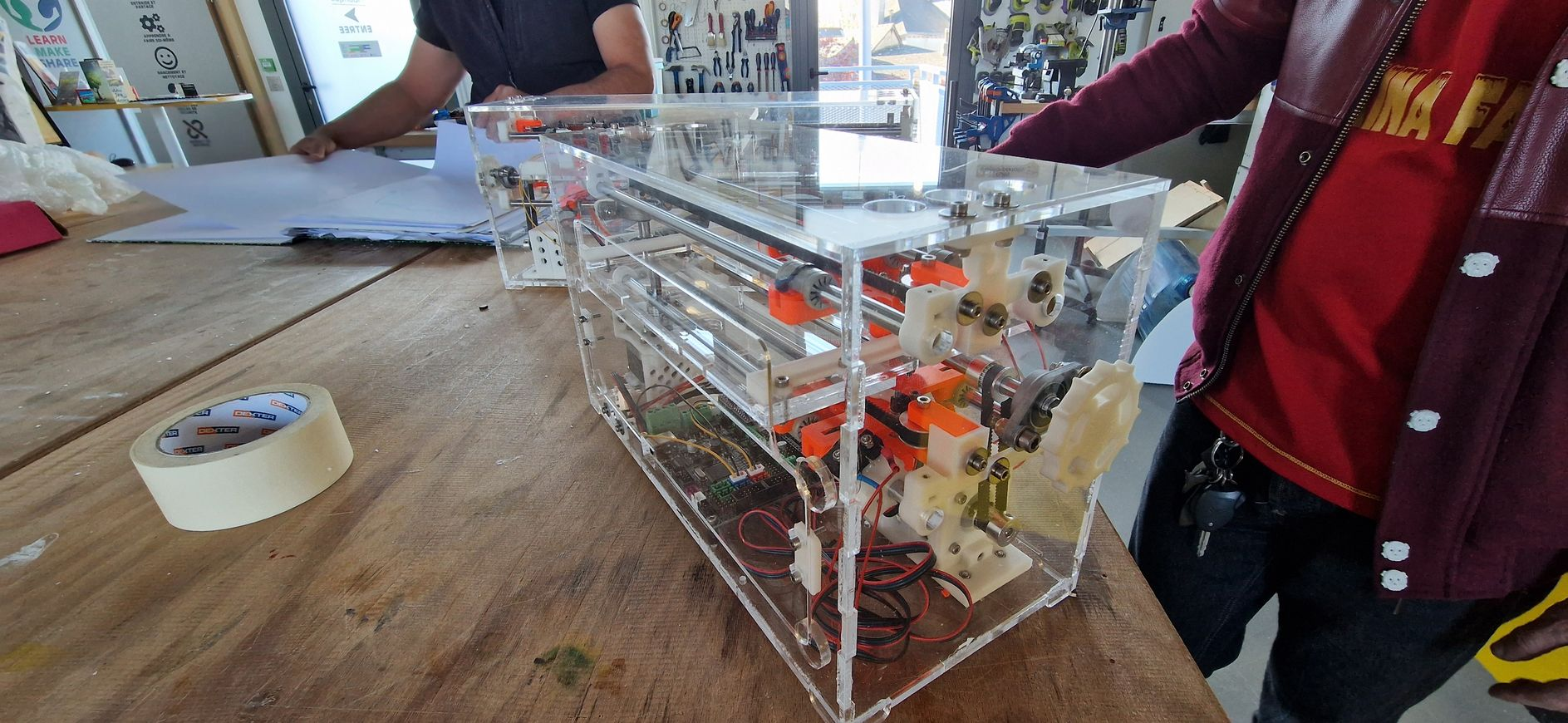
Next stop: e-Fabrik / Paris
Another suburb: this time near Paris.
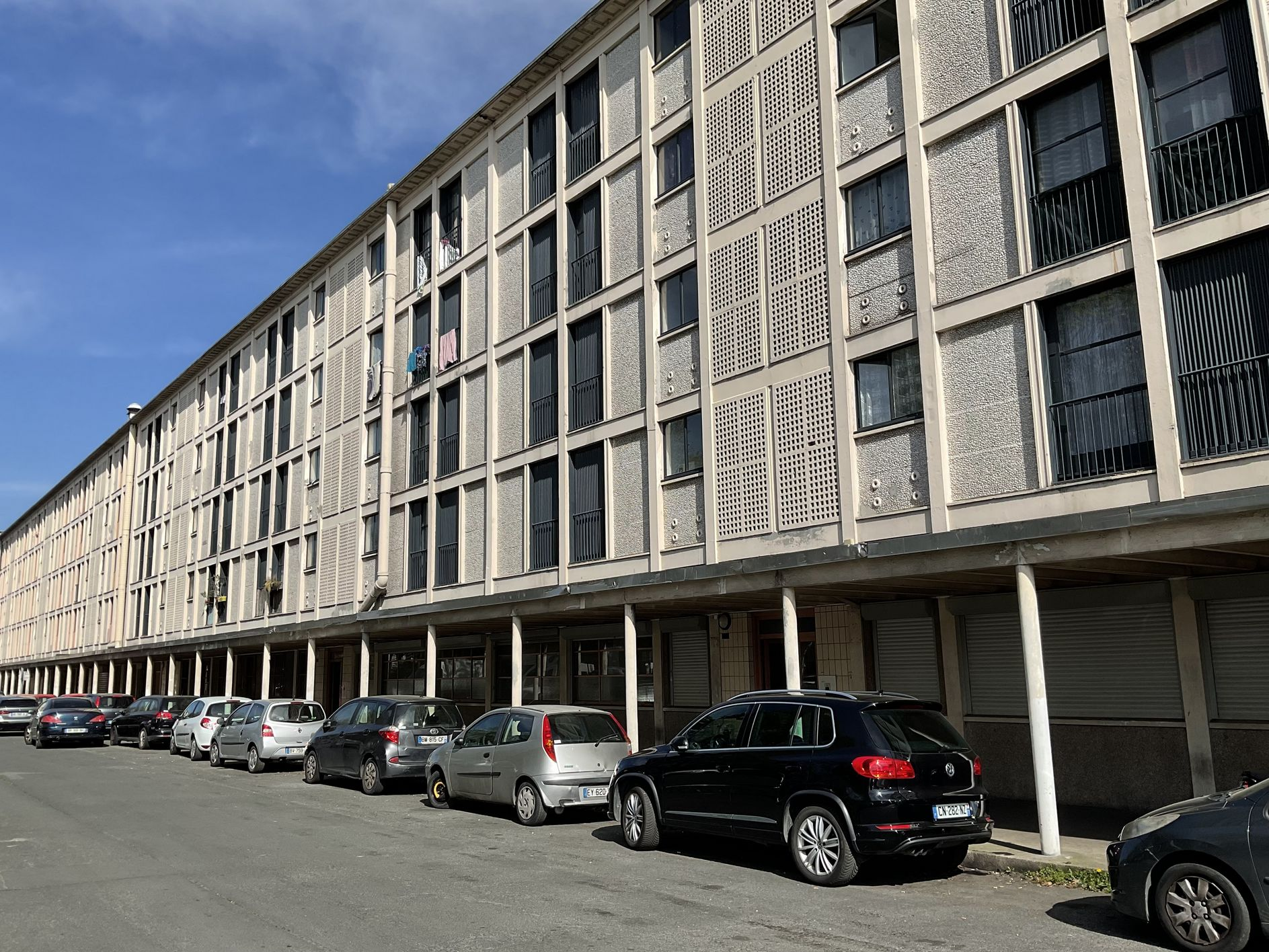
The e-factory is hidden here in Drancy. The makers there offer (among other things) a 4-month course in which young people (unemployed, school dropouts, etc.) receive (free) further training. On the one hand, they learn the common Lab techniques (electronics, lasers, 3D construction, prototyping, etc.) and so that it is not just theory, it is applied in practice, namely to applications/solutions for people with disabilities: Applications/solutions for people with disabilities, with the range from autism to physical limitations open to all. One project, for example, is for people who are unable to express themselves and hardly react to stimuli or are supposed to train certain stimuli, e.g. to a breeze on their skin or a scent.
Children with various disabilities also come to hackathons from a local school. Of course, this also requires empathy and soft skills. These are also taught. If blind people come to the workshop, everyone is provided with an assistant to ‘navigate’ and make things - there is no other way to realise this in such workshops. This is often the first time in their lives that the course participants have been able to do something practical and at the same time work independently and creatively.
How well received is that? The longest daily (!) journey was made by a participant from the south of Paris - over an hour each way by public transport. The programme has been running for 10 years and every now and then a person with a disability takes part in the training :-) . However, such ‘autonomous’ visitors are rather rare; the programme usually works together with disability support structures and therefore primarily with visitors - and therefore also projects for - people who are not (reasonably) able to travel independently.
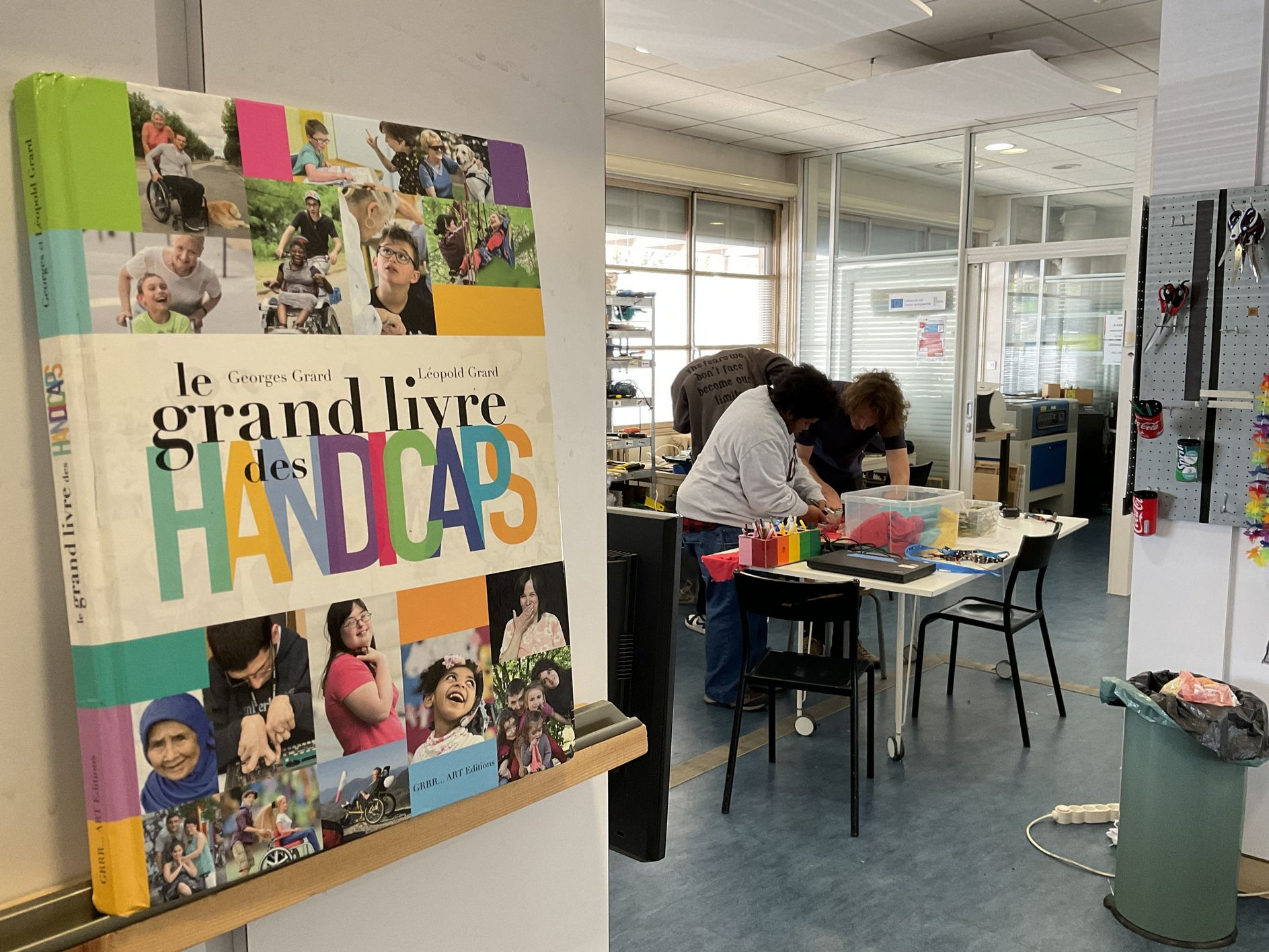
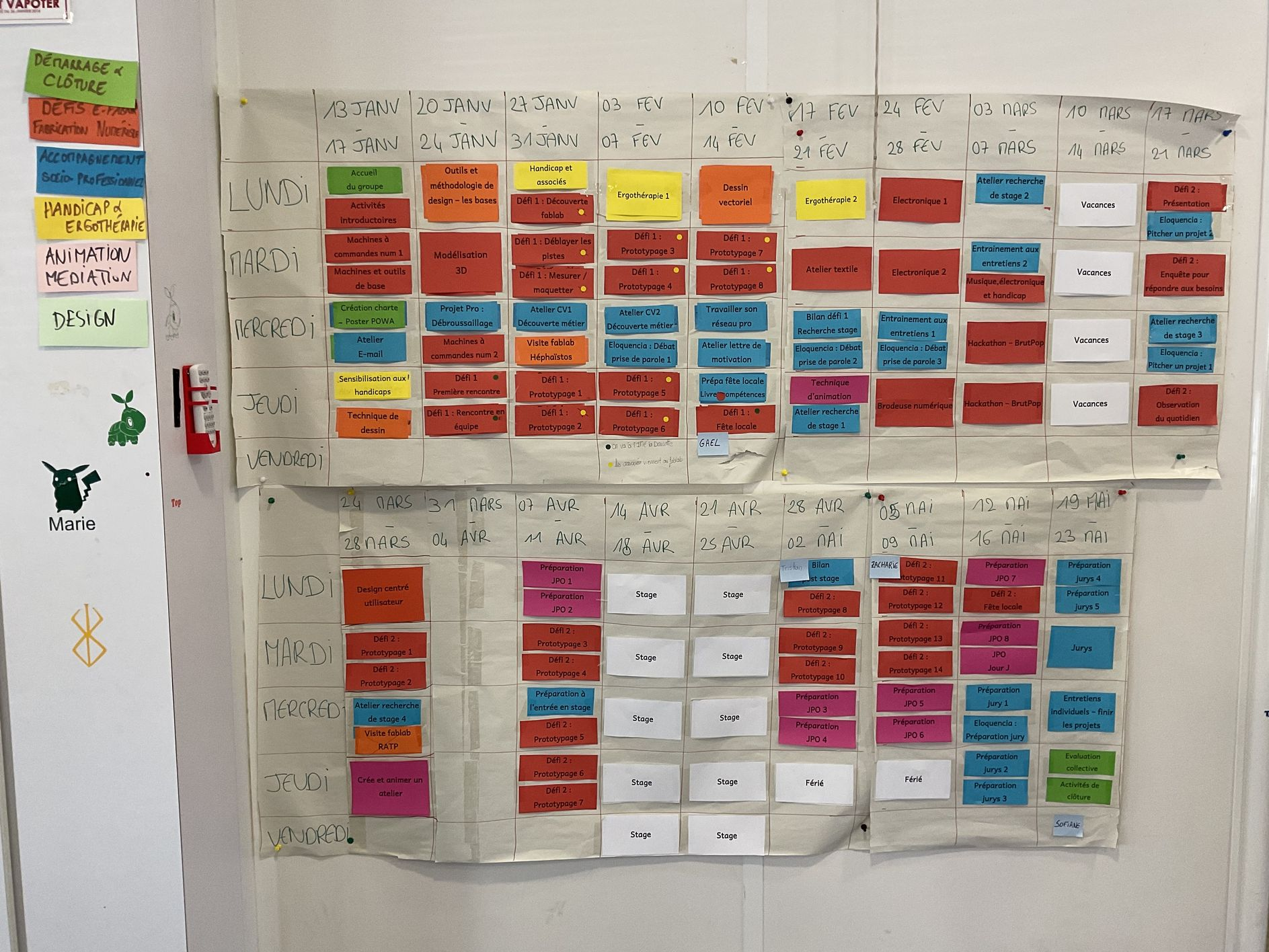
Fully planned: the training runs from mid-Jan - to mid-May
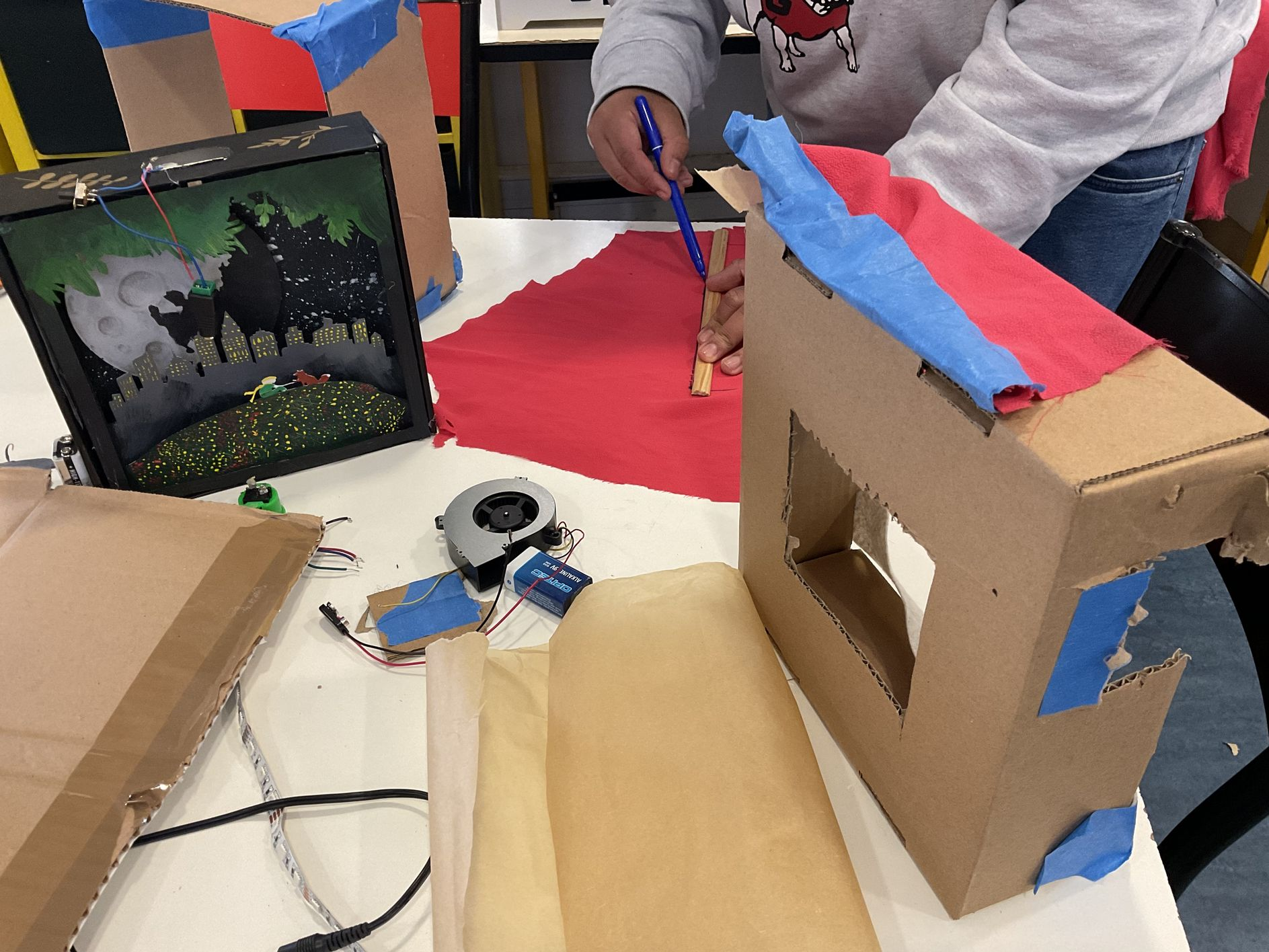
Let's continue
From here, we head south again. Via Clermont Ferrand and the Lab in Millau, the route continues to Narbonne and then back to Perpignan - where more time is planned this time.

You rarely see a furnace for melting aluminium. (Fablab Millau)
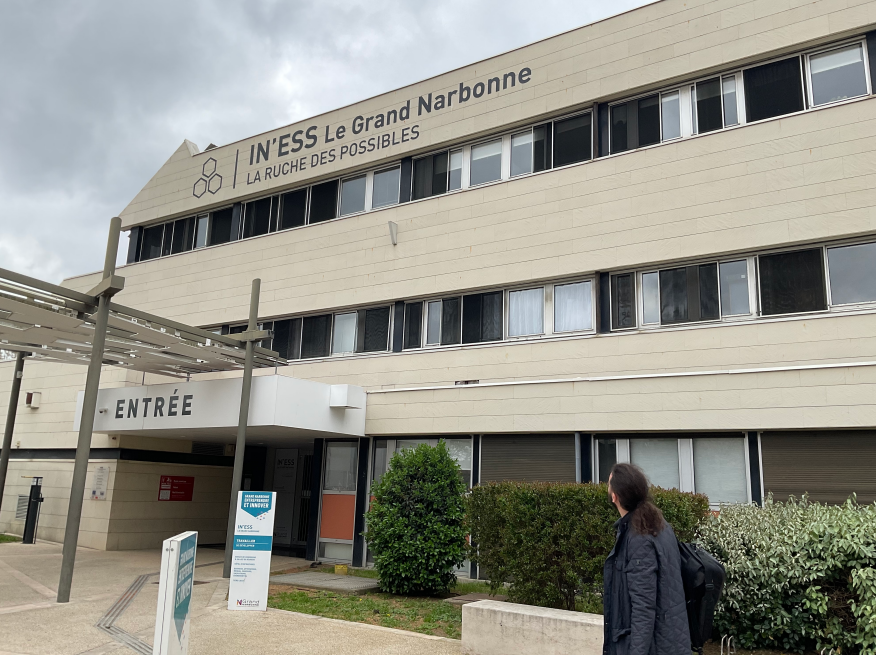
centre (of the region).
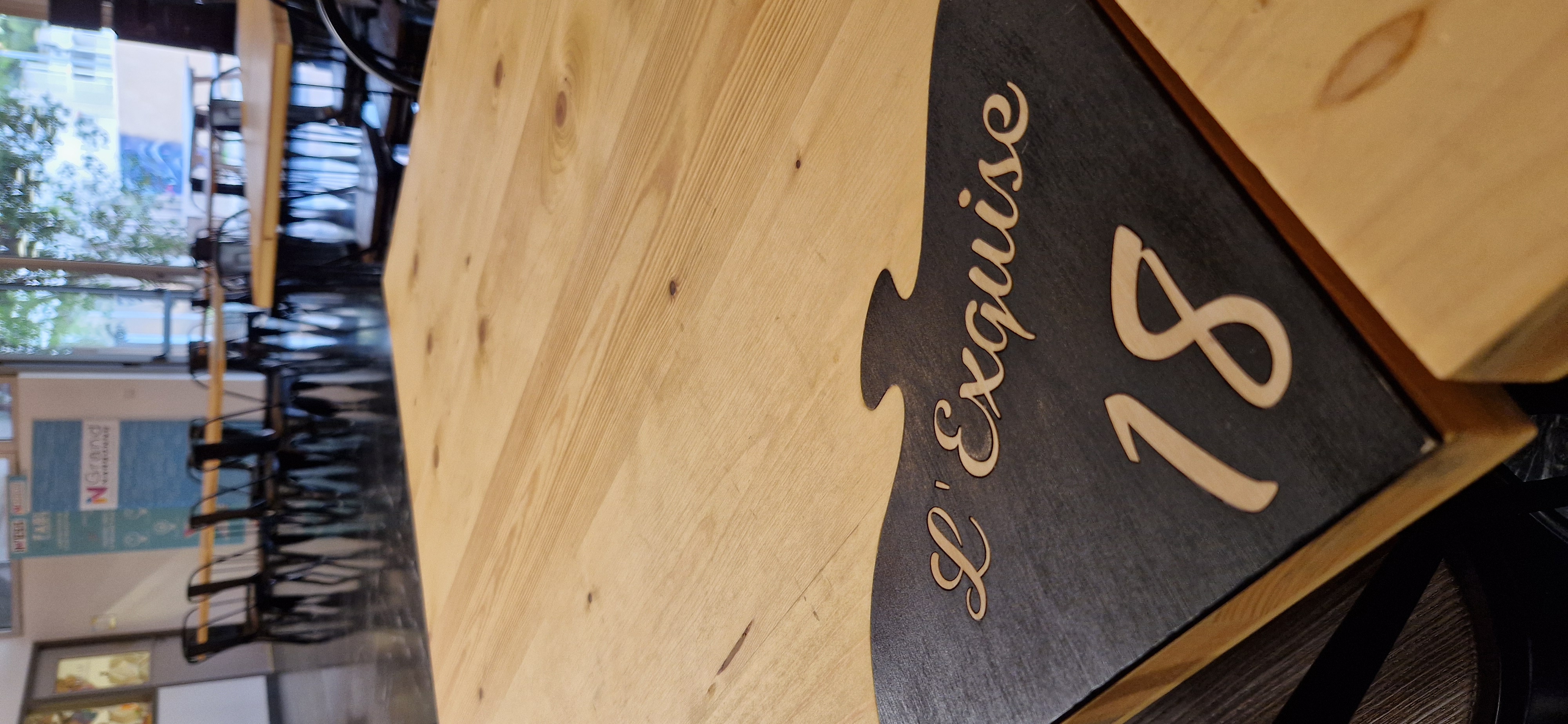
1. Stop: La Cyber Fabrique / Le Soler
Here, in La Cyber Fabrique, lives Ivan - a maker who has retrained in orthopaedics. After building a kind of exoskeleton for himself using 3D printing and the like. Ivan is also the creator of the Boule aid at the top of the article. He has also built other aids and adapters, e.g. for hands and prostheses. One example was a torch holder for the Olympic torch last year in Paris. The torch is traditionally passed around the whole country and carried for a short distance by a wide variety of people.
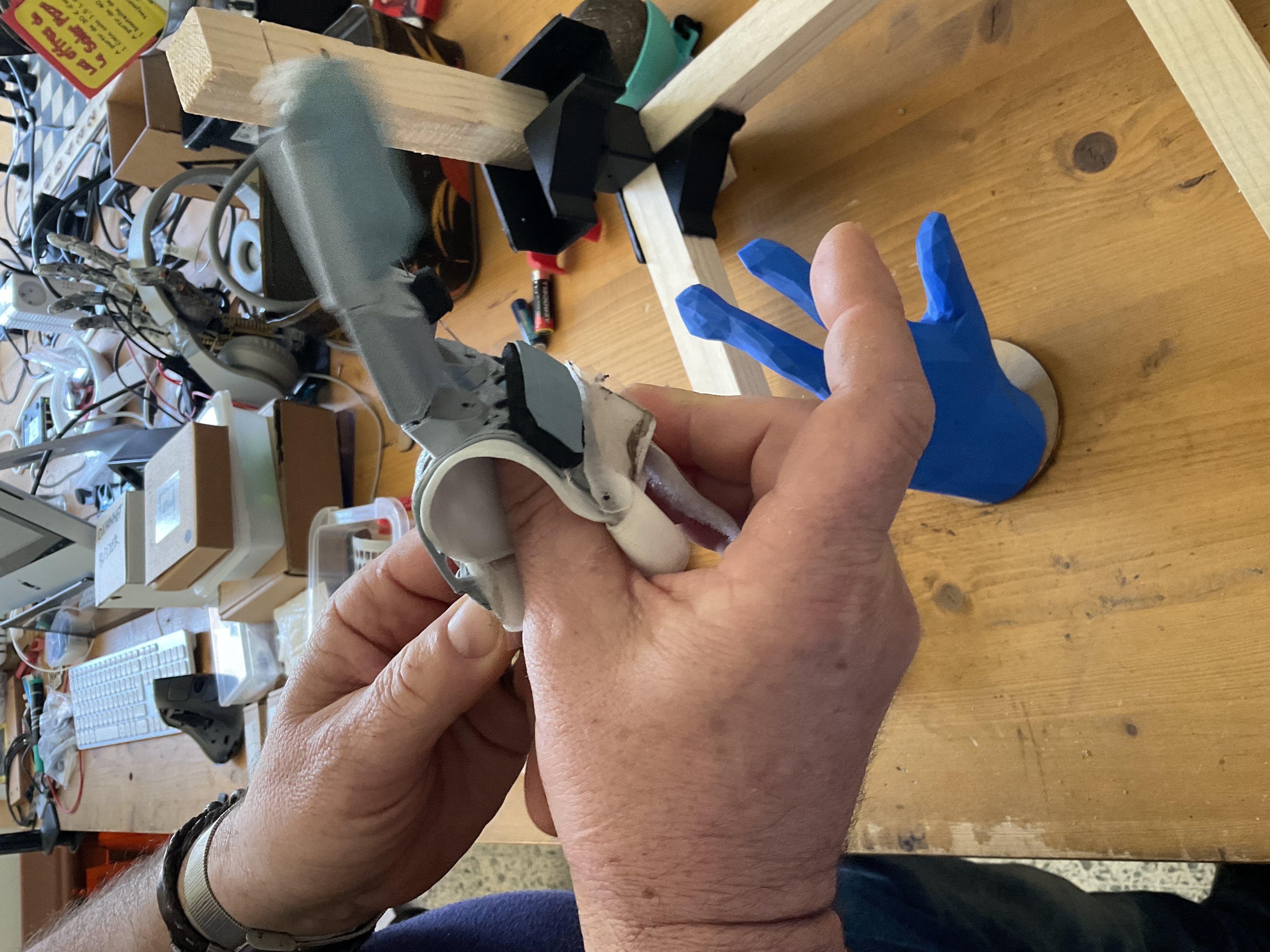
2. Stop in Perpignan: the SchulFabLab from Nicolas
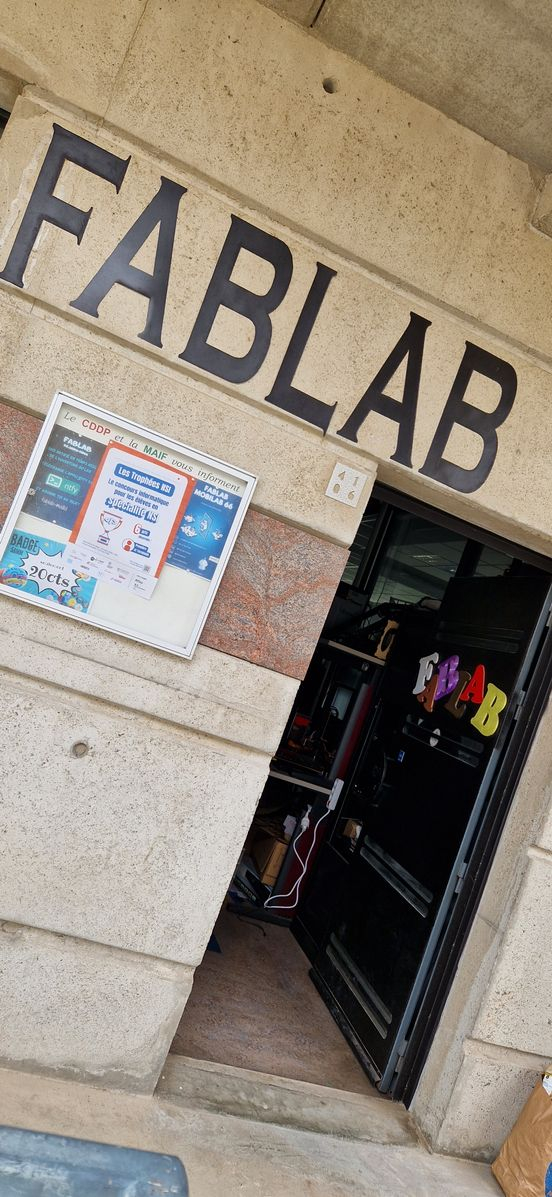
What's cool about this workshop is that although it's in a school, people can come from outside (during school opening hours - so not in the holidays or evenings) and that they can also take part in external events (such as the hackathon). In addition, the pupils have the opportunity to become active in the workshop themselves without a teacher having to be present after they have received an introduction.
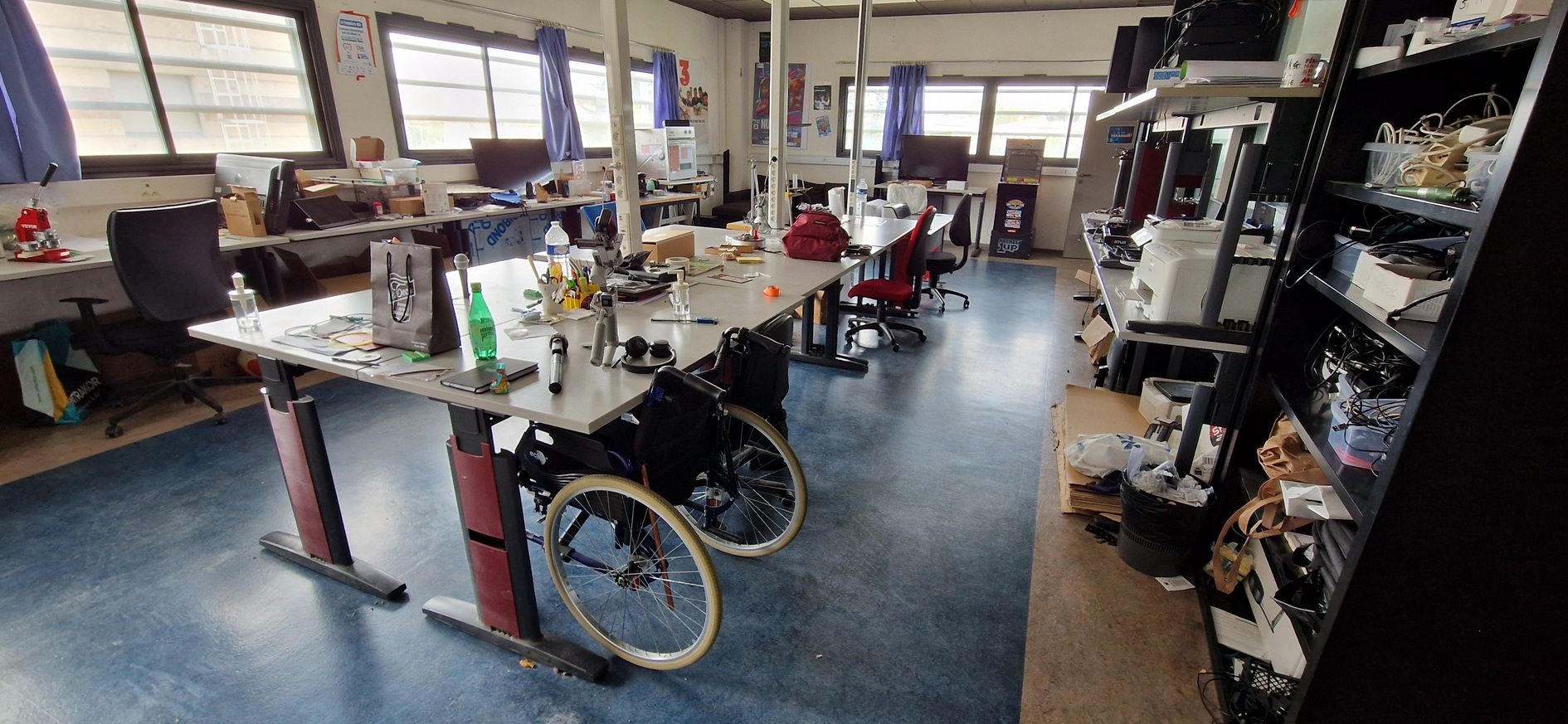
View of FabLab 66. There's additionally a 360° tour by Axel.
3. Stop: Airbus Protospace
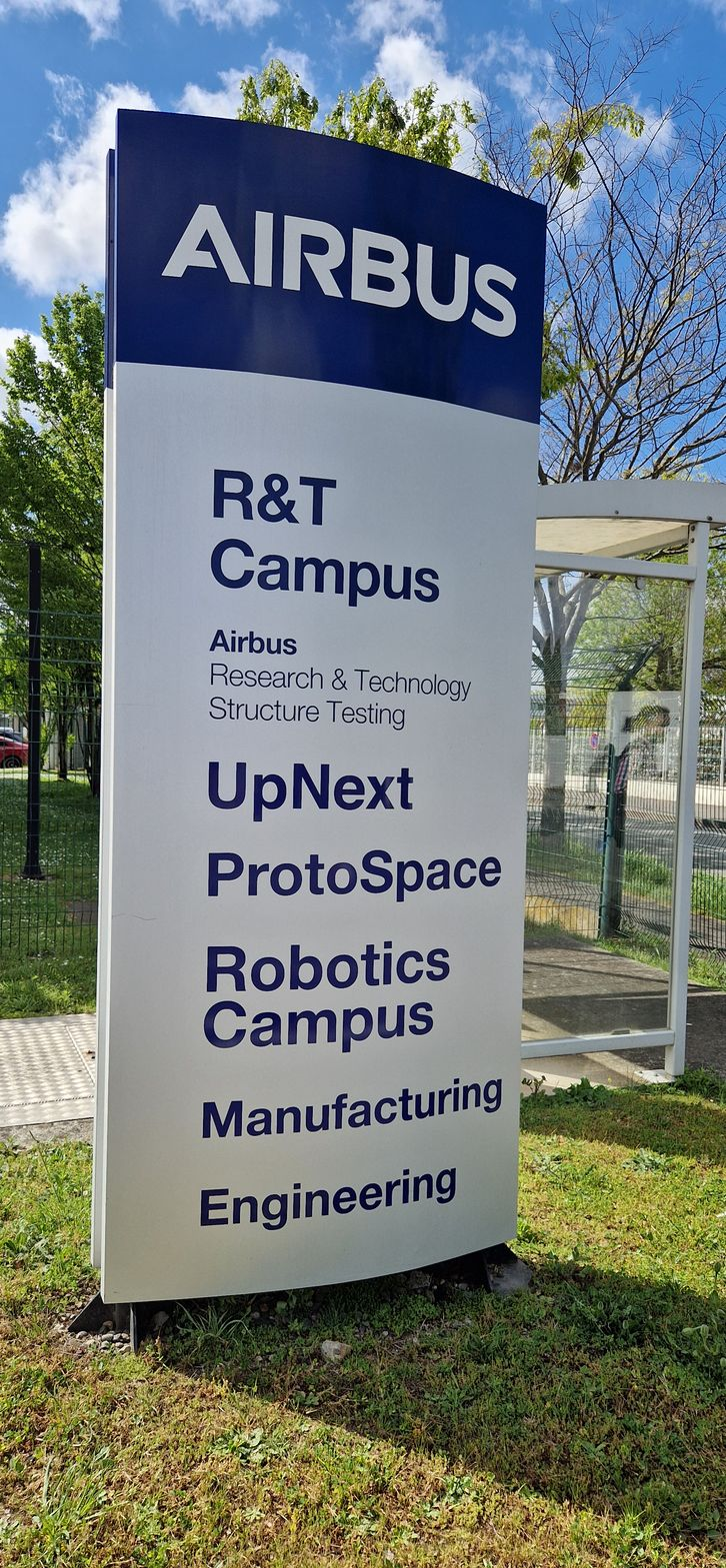
From Perpignan, the journey continues to Toulouse. In addition to an obligatory visit to our friends at the RoseLab, this time Airbus' Protospace is on the list of places to visit: This is not a public lab in the original sense.
With Christophe - the head of the lab - we are once again close to our topic. Years ago, he built a stylish LED prosthesis for himself. Motto: why should you always hide it? A prosthesis can also be worn as jewellery See e.g. here: ladepeche.fr.
Airbus and the lab are involved in completely different projects than we have seen so far. Solutions are being built here that will be used at the Paralympics. The HumanityLab project: provides help from the Airbus Group and then the prototype is built internally (on a voluntary basis). Those affected or NGOs enquire with their concerns and the HumanityLab or Christophe look for solutions and support within the company.
They have excellent connections with experts in the Group, which helps in the search for suitable people (high-tech carbon needs experts). Positive side effect: training for the respective employees in the area of social skills, etc.
Otherwise, Protospace is more or less an internal ideas and prototyping centre. This is the case at many Airbus sites.
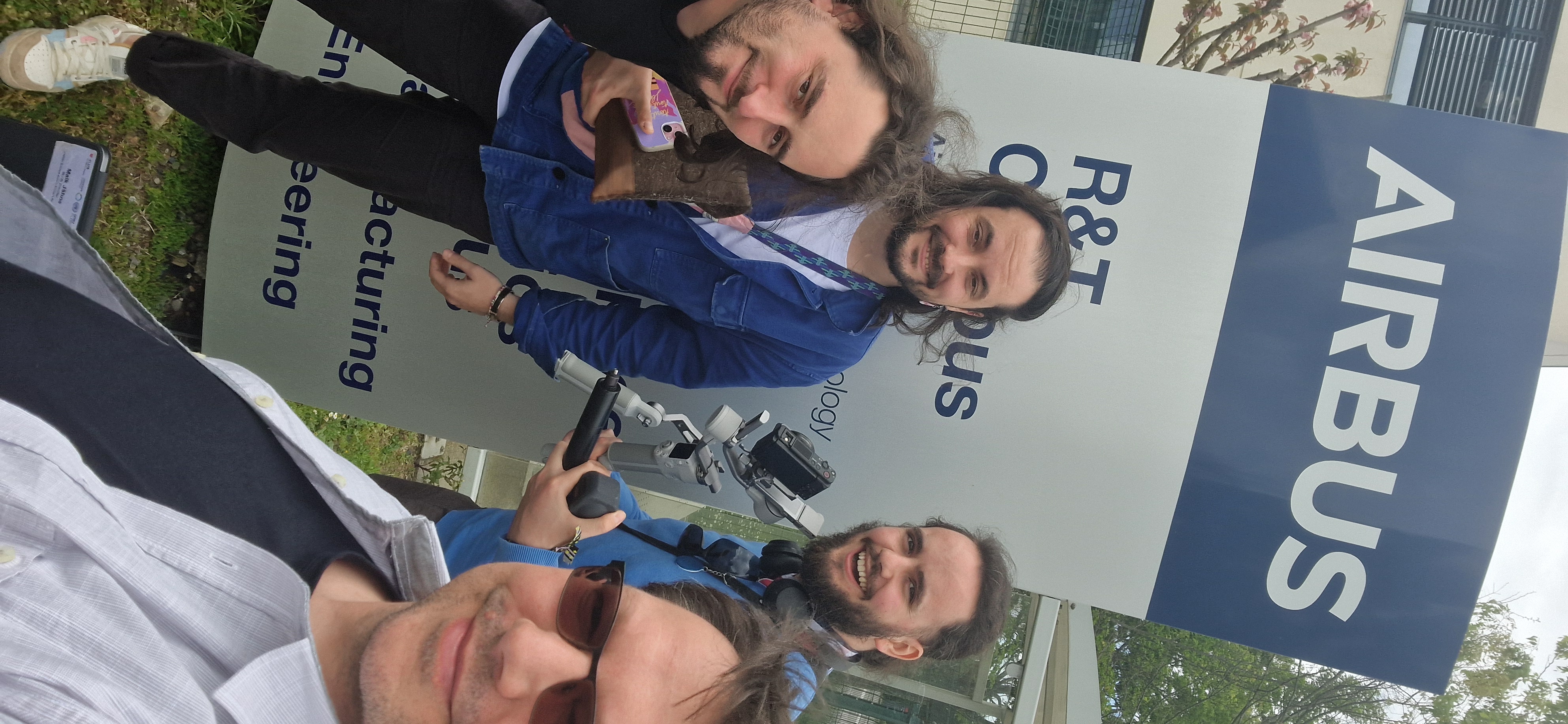
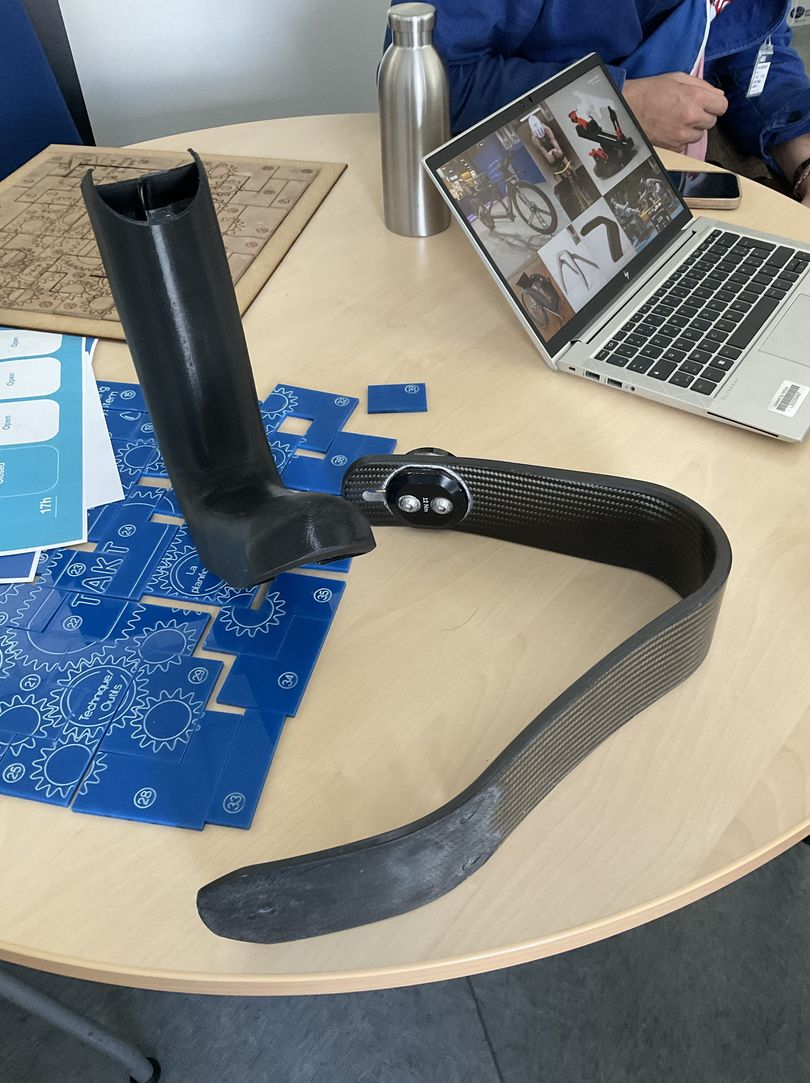
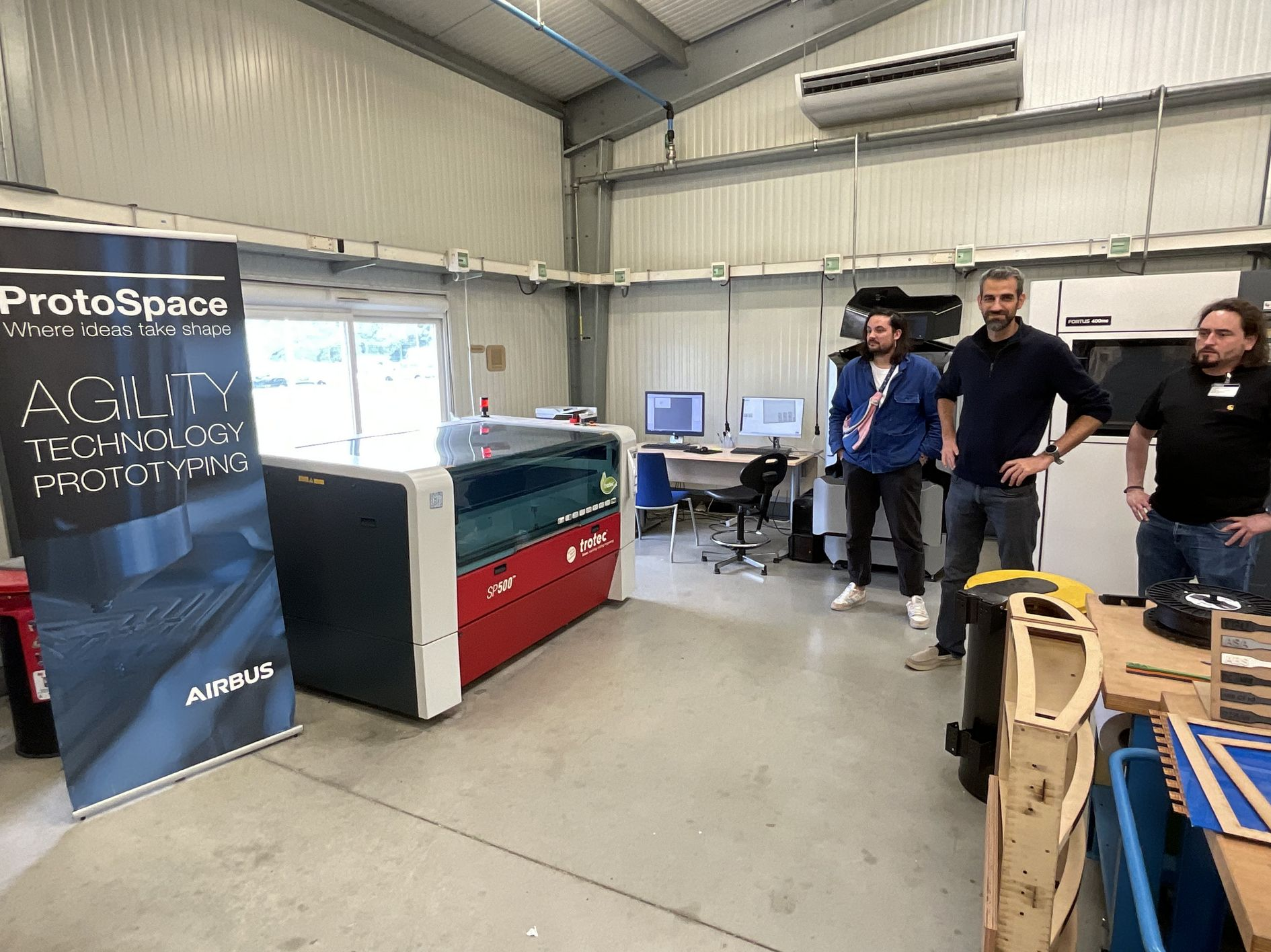
4. Stop: AciLab / Limoux
The next stop on my journey is (once again) Limoux, the AciLab. The focus here is on other handicaps. For many years, (long-term) unemployed people have been trained as Fab Managers. In just a few months, they are taught the basics of FreeCAD, Blender & Inkscape and work in the lab with 3D printers, CNC milling machines and laser cutters. Once they have got the hang of it, they then look after the users of the lab or build their own products. I finally get to experience the lab in person and can talk to them directly about their training and motivation.
What also works really well is that they pass on their newly acquired knowledge to their colleagues on the course. This is where introverts blossom and experience self-efficacy.
The course is a colourful mix of ages, origins, education and professional backgrounds. This leads to situations where the ‘youngsters’ are amazed - they always start Google or an app for something ‘technical’, while the older ones quickly do some maths in their heads. In general, a lot is probably about momentum (in the group), learning bit by bit and from each other: even complex software tools and then machines up to CNC milling machines. But it helps immensely to know that you don't have to be able to do everything straight away.
The lab is part of an organisation that collects used goods from the recycling centre, processes them and sells them again. This also brings in mountains of old bicycles. These are refurbished in ‘repair courses’. The young people, often immigrants or migrants, learn in the (subsidised) courses what to look out for when repairing bikes and at the end they can keep the bike. As they have built and repaired it themselves, their appreciation of the object and their technical knowledge increases. And because they worked in a group, their language and social skills also improve. The success and the realisation that ‘I can do this’ is often a springboard for a further, improved professional career.
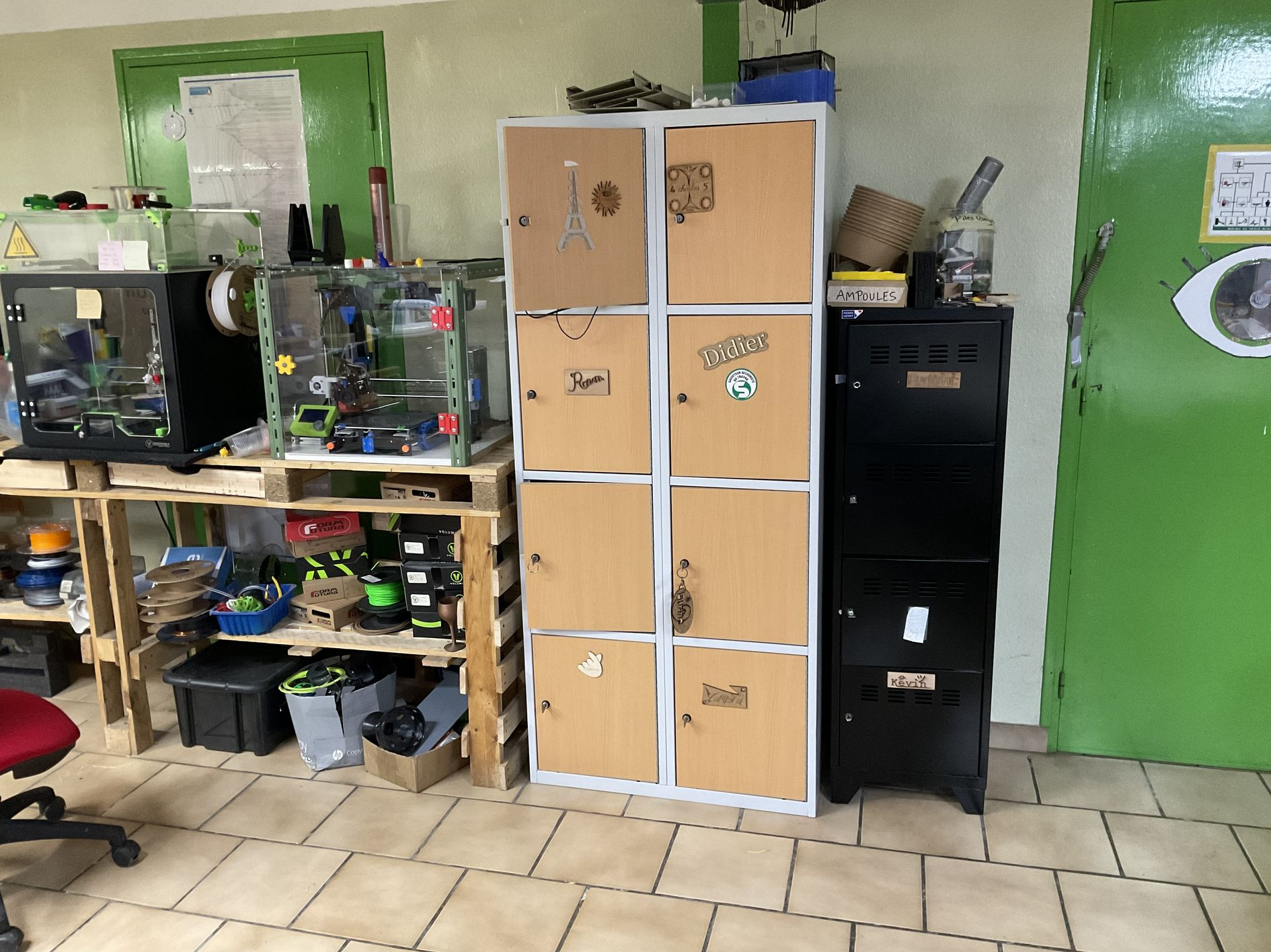
The course has 12 participants, one of the first tasks: create your locker sign
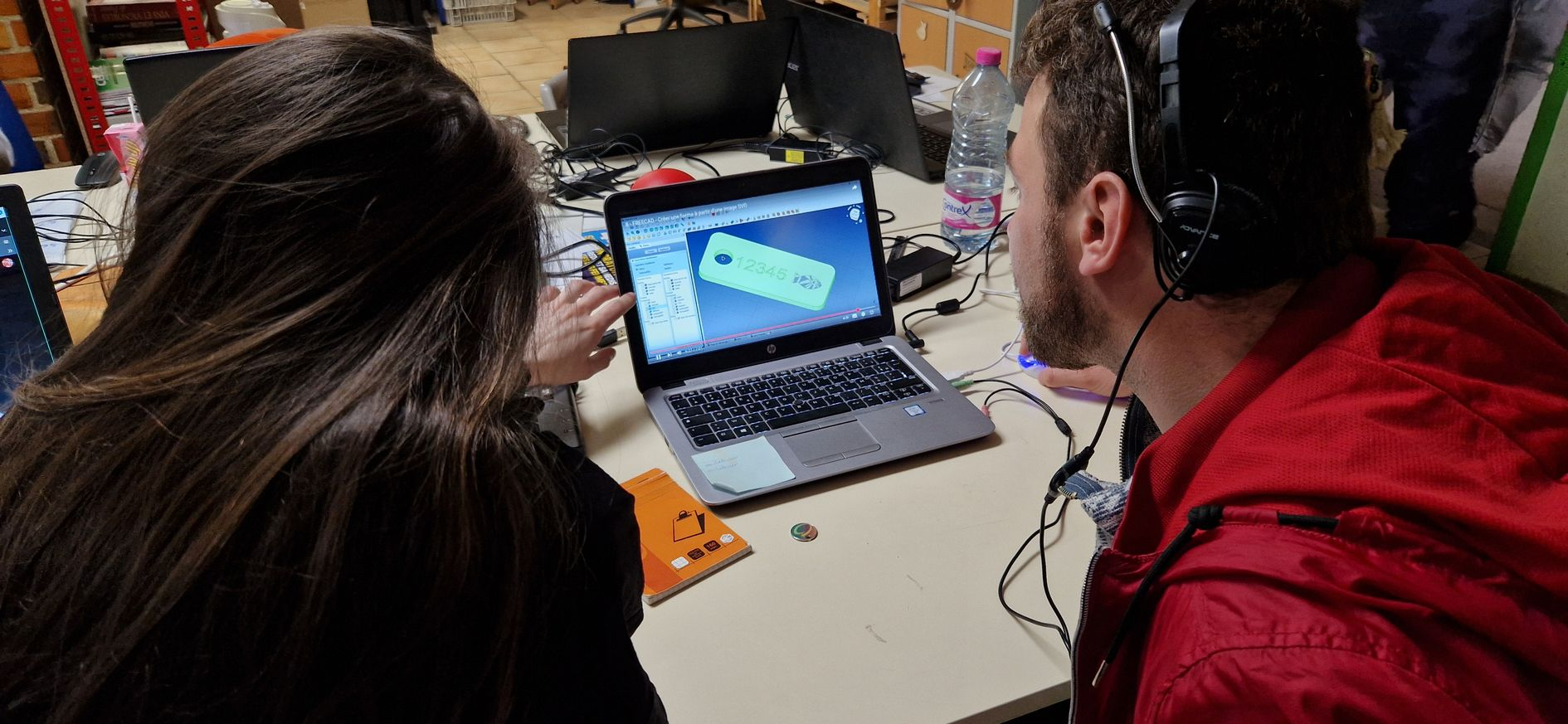
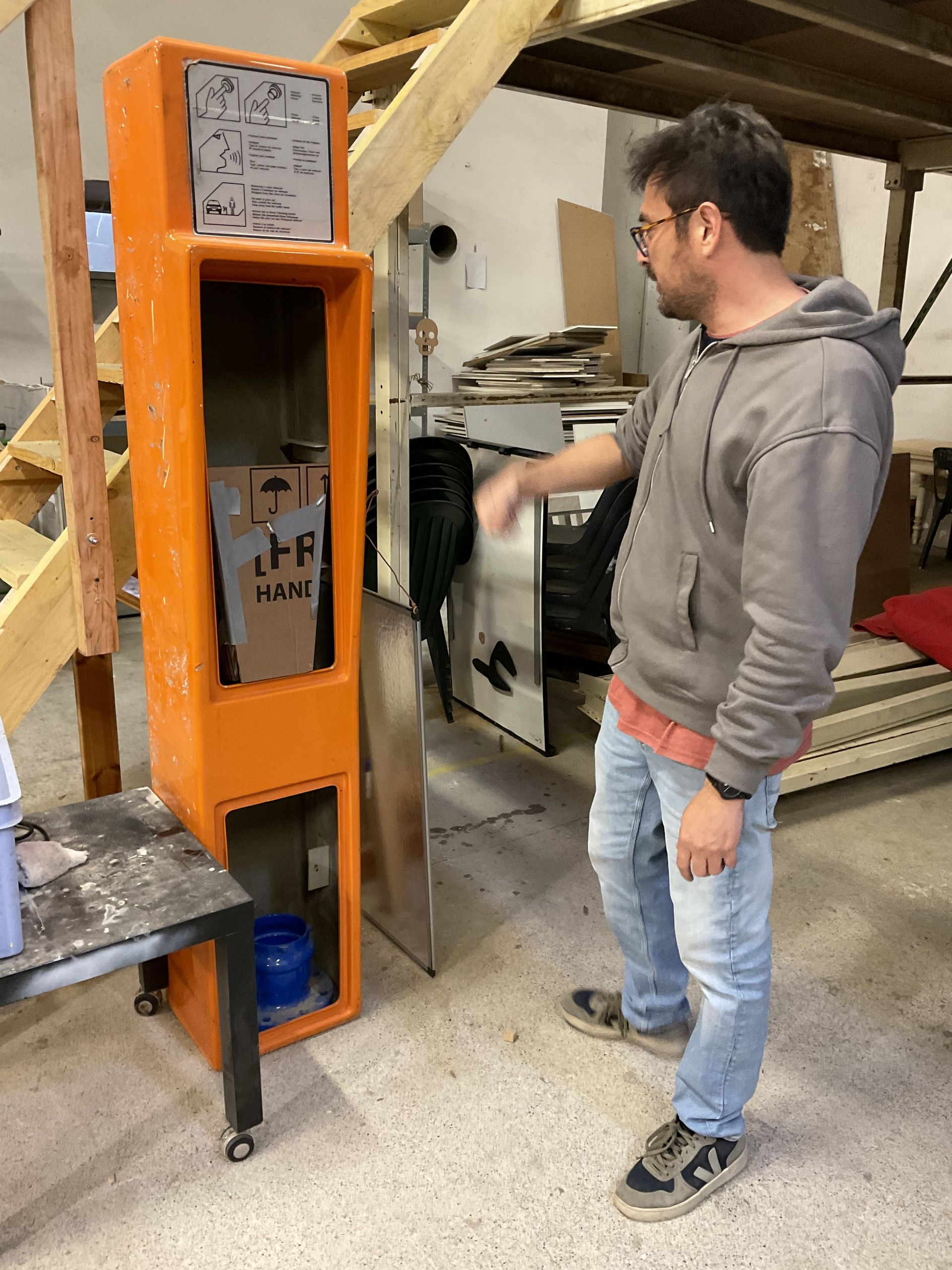
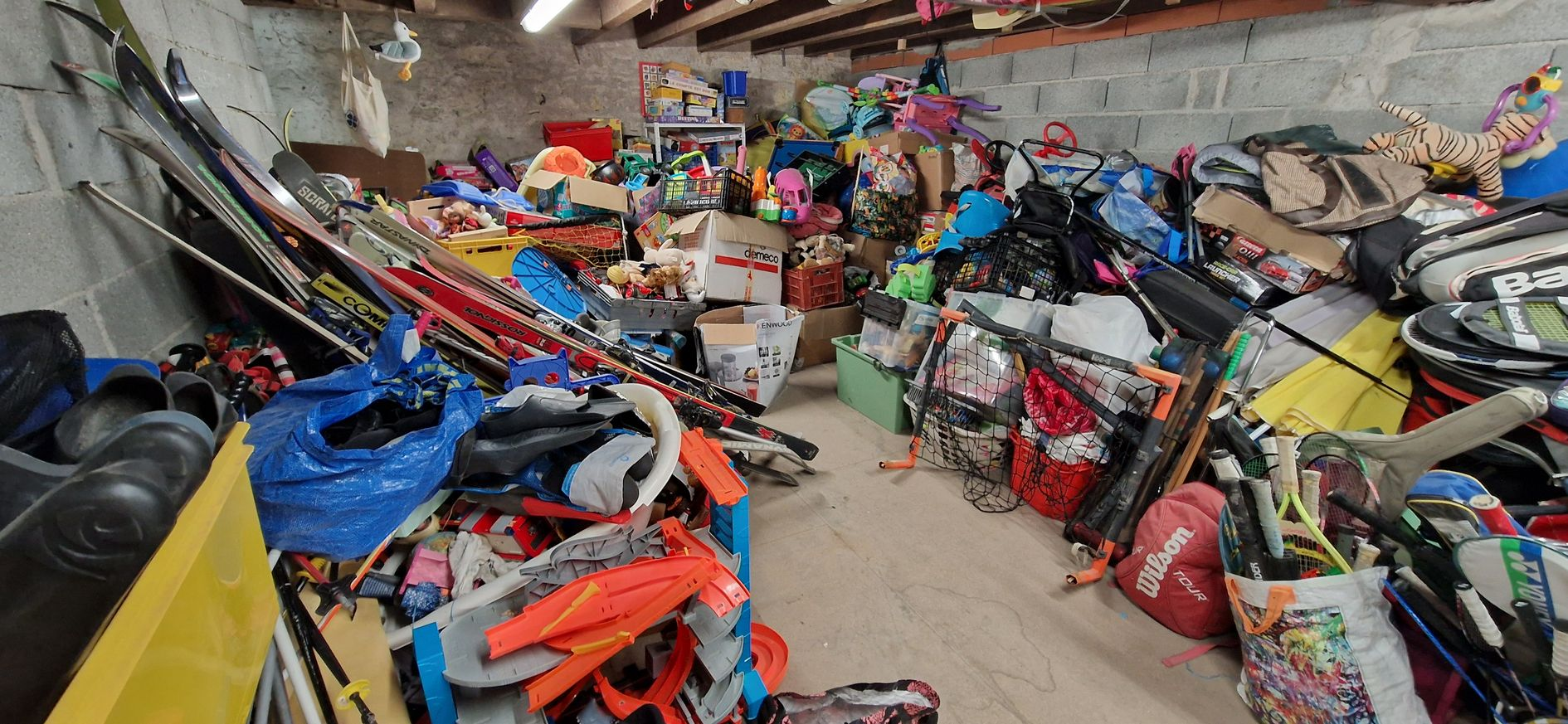
The idea: reuse makes more sense than shredding and recycling - look into the interim storage - unsorted.
5. Stop: Lab Sud / Montpellier
As we have already learned from our travels in France, there are a number of labs that specialise in health, medical aids and the like. Open Health (i.e. open source medical products) is a topic at Lab Sud in Montpellier.
Amel is the ‘driving force’ here (to the right of me in the group photo). She herself is in a wheelchair, is an entrepreneur and is trying to develop new things with the FabLab crew and provide impetus in this Open Health area.
What brought Amel to the lab? She couldn't sit properly (in her own wheelchair) and needed a DIY solution… because there was nothing off the shelf (sensible or affordable or even the experts had reached their limits). Via Google she came across My Human Kit and Hugues (see above) and then the whole thing took its course.
One of her colleagues at LabSud is Giome. Giome explains to me how customised seat cushions are built to prevent sores and support good posture when sitting in a wheelchair for hours on end. One aid: a sensor cushion for €6,000, which not even all professionals can afford. Sore sitting is not a minor problem, but affects more than a million people and the (consequential) costs are in the billions.
The aim of the project here is to simplify the measurement of problem areas in order to enable favourable solutions for better wheelchair sitting all over the world. One target country for such solutions that is repeatedly mentioned: Senegal. French history plays a role here and the language barrier no longer applies.
The LabSud location is also a ‘third place’. You are a subtenant, so to speak, and there are concert halls, a bar, urban gardening, a playground, green spaces and co-working - all of this is right in the halls and on the (former military) site, virtually next door. A nice mix. Unfortunately, the path to the lab is so uneven that it is almost impossible for people like Amel to get there without pain. Even if ramps make it possible to get into the building and everything is wheelchair accessible. If the roads and paths are unsuitable - that doesn't help much. An access route via public transport (tram) is currently under construction.
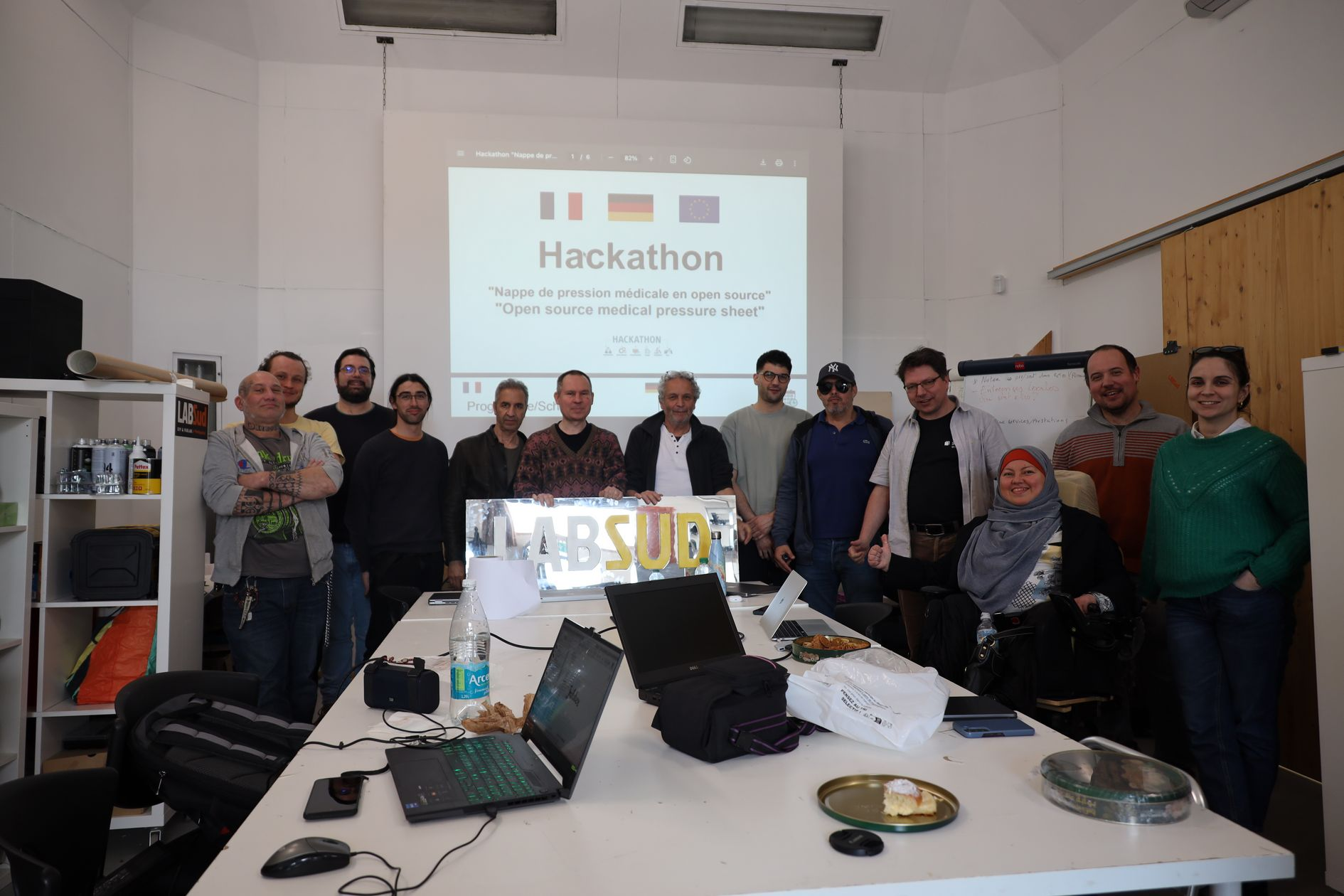
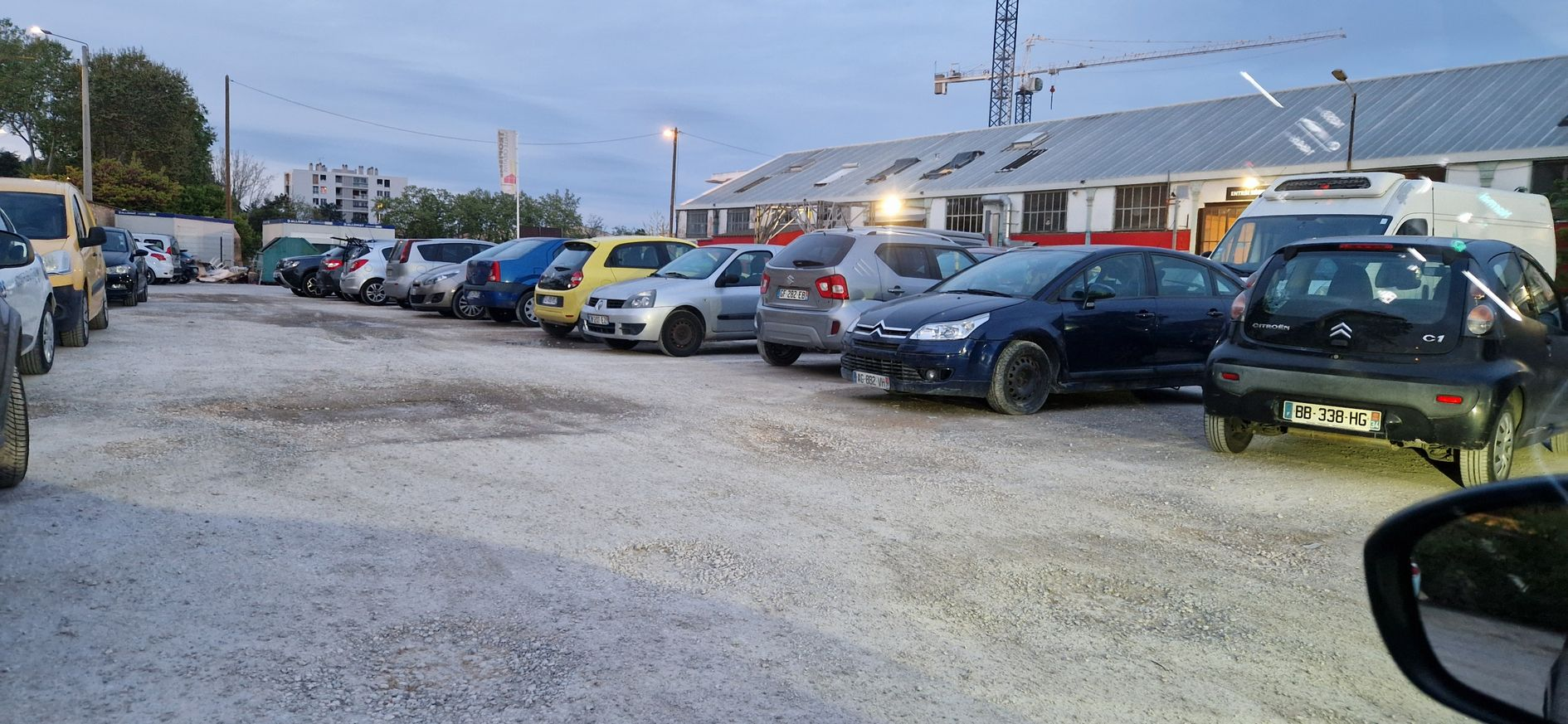
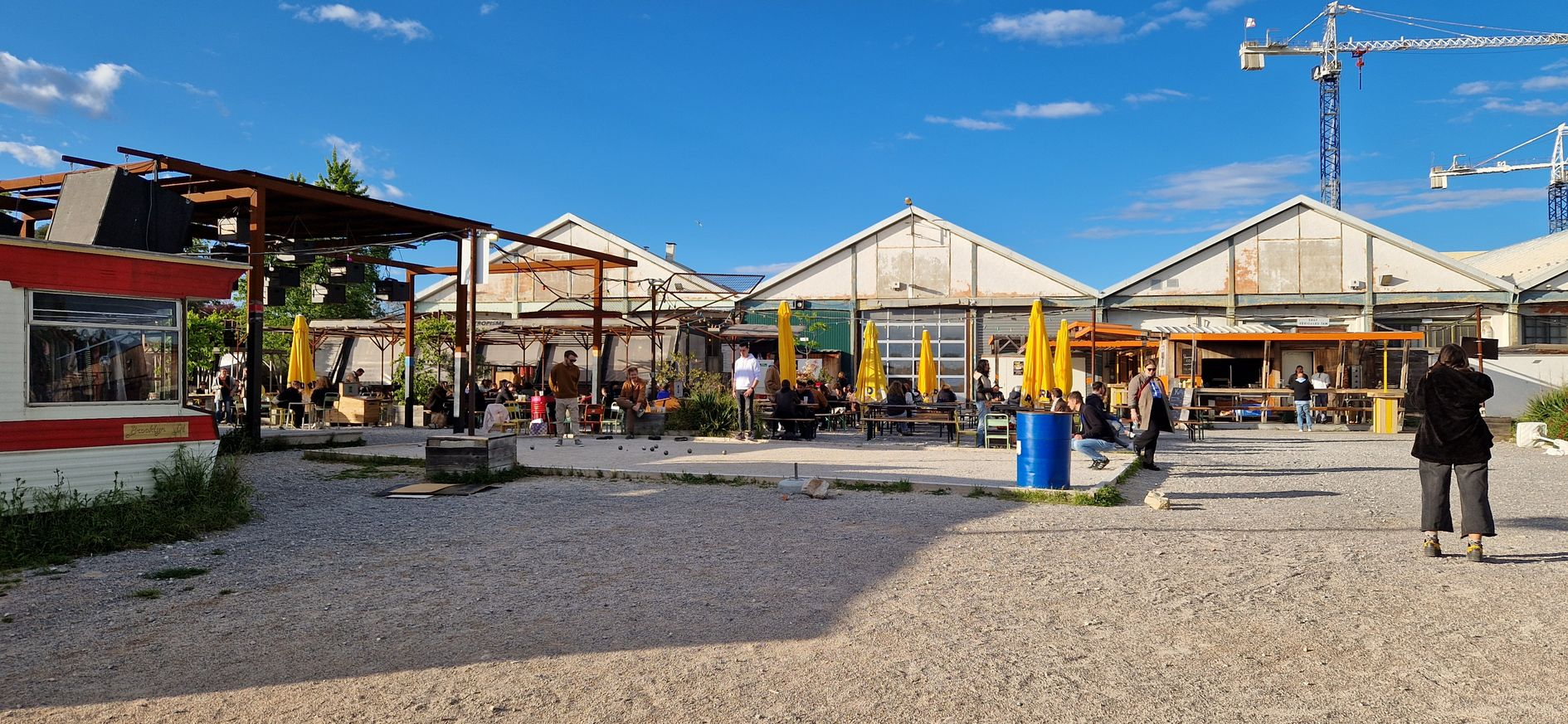
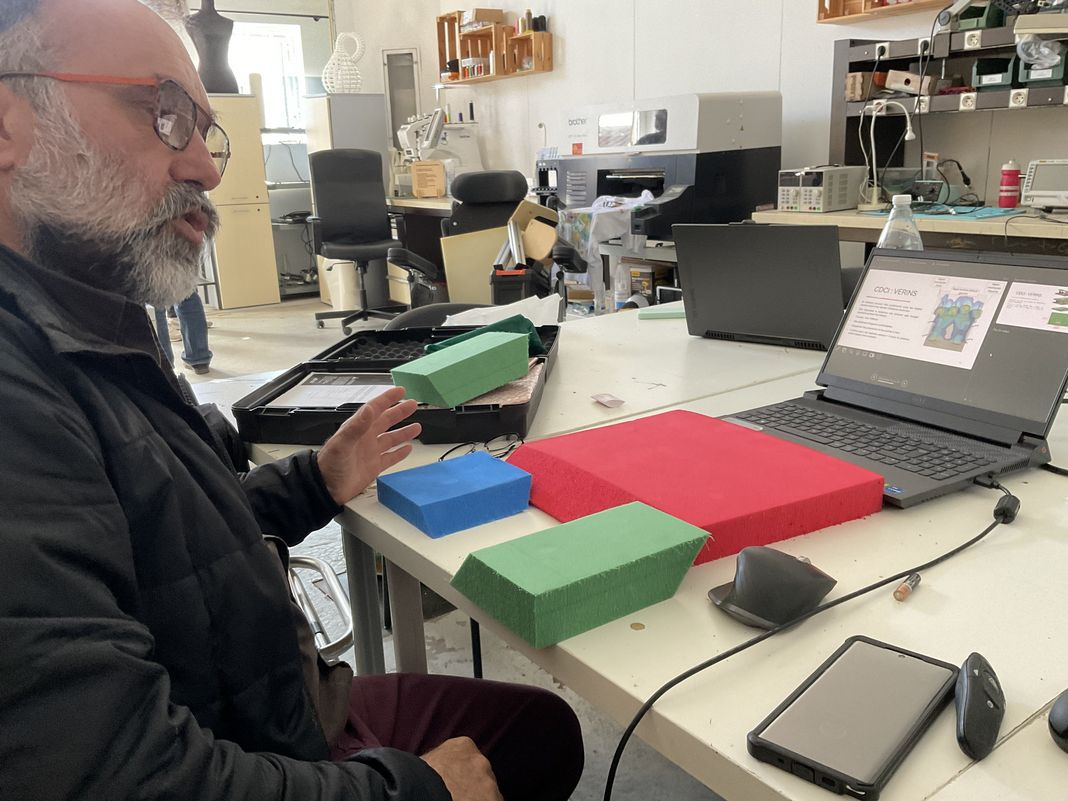
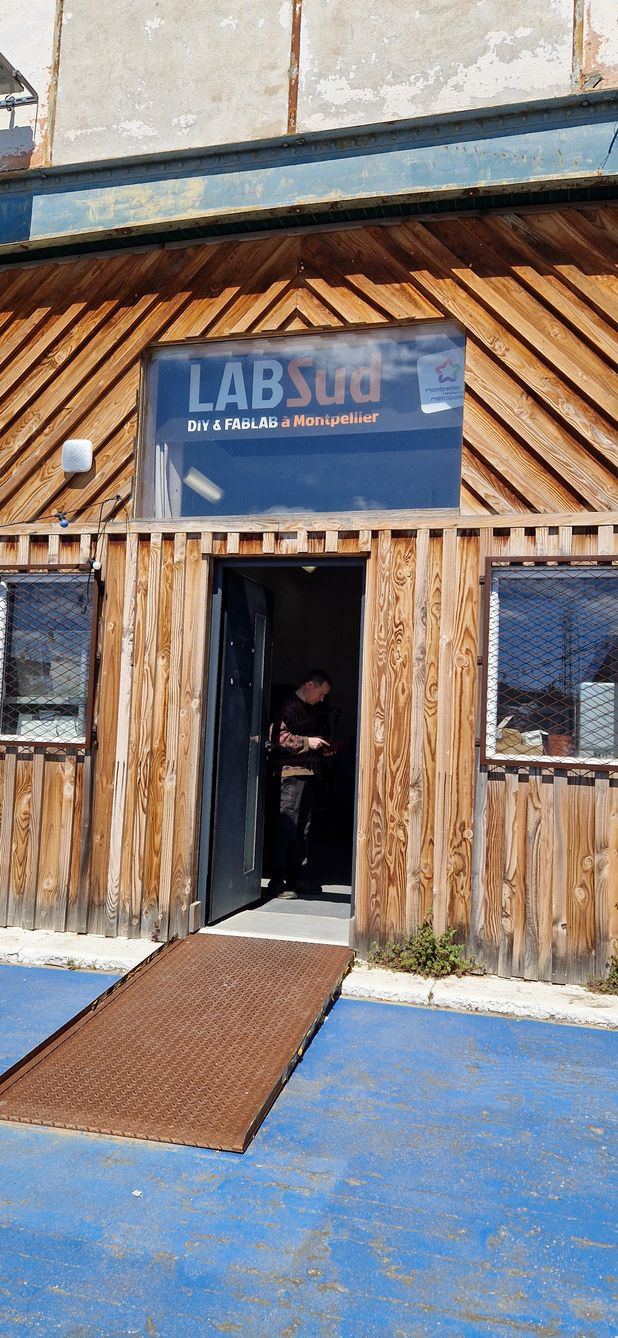
6. Stop: HumanLab St. Pierre
We also had to make a short detour to HumanLab St Pierre (10 km towards the beach, Palavas-les-Flots). This is a FabLab in a hospital.
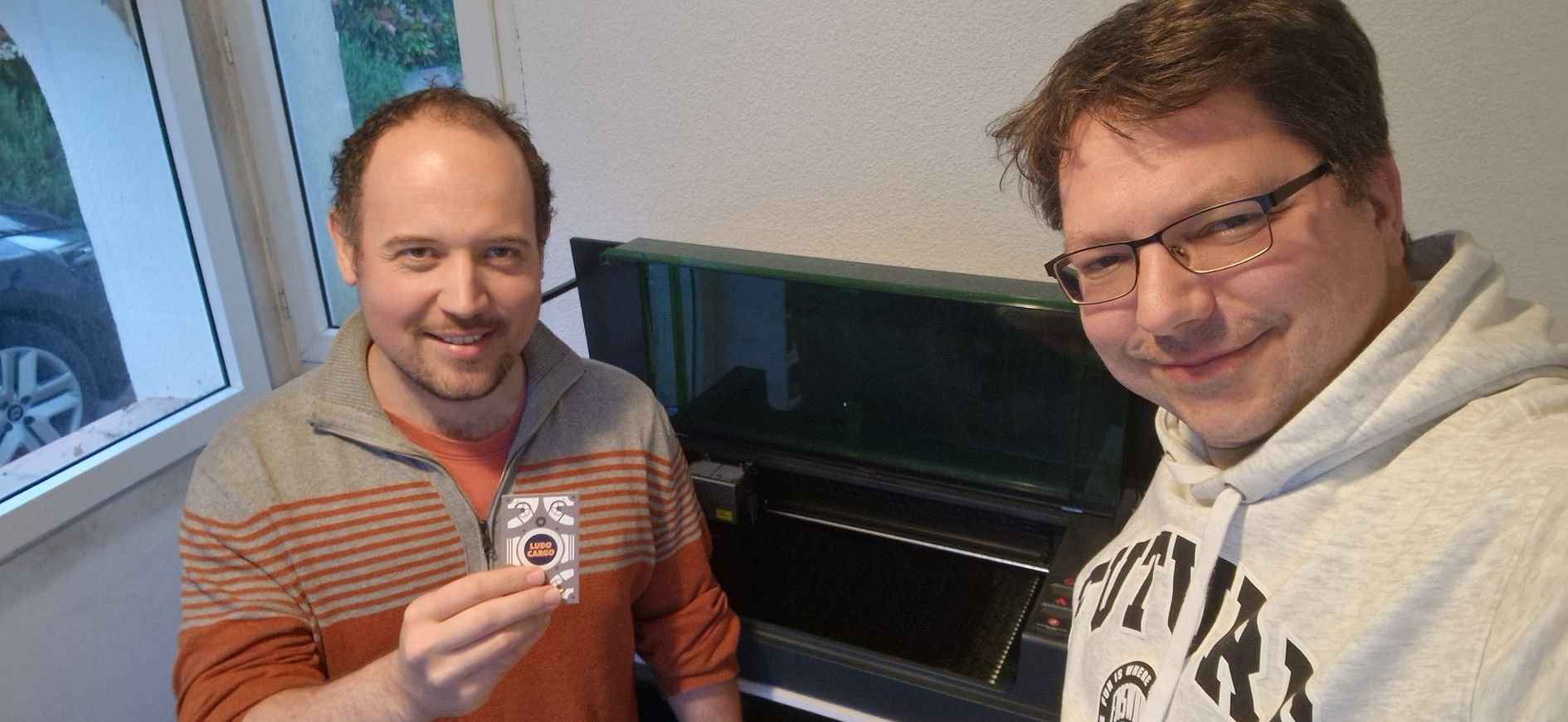
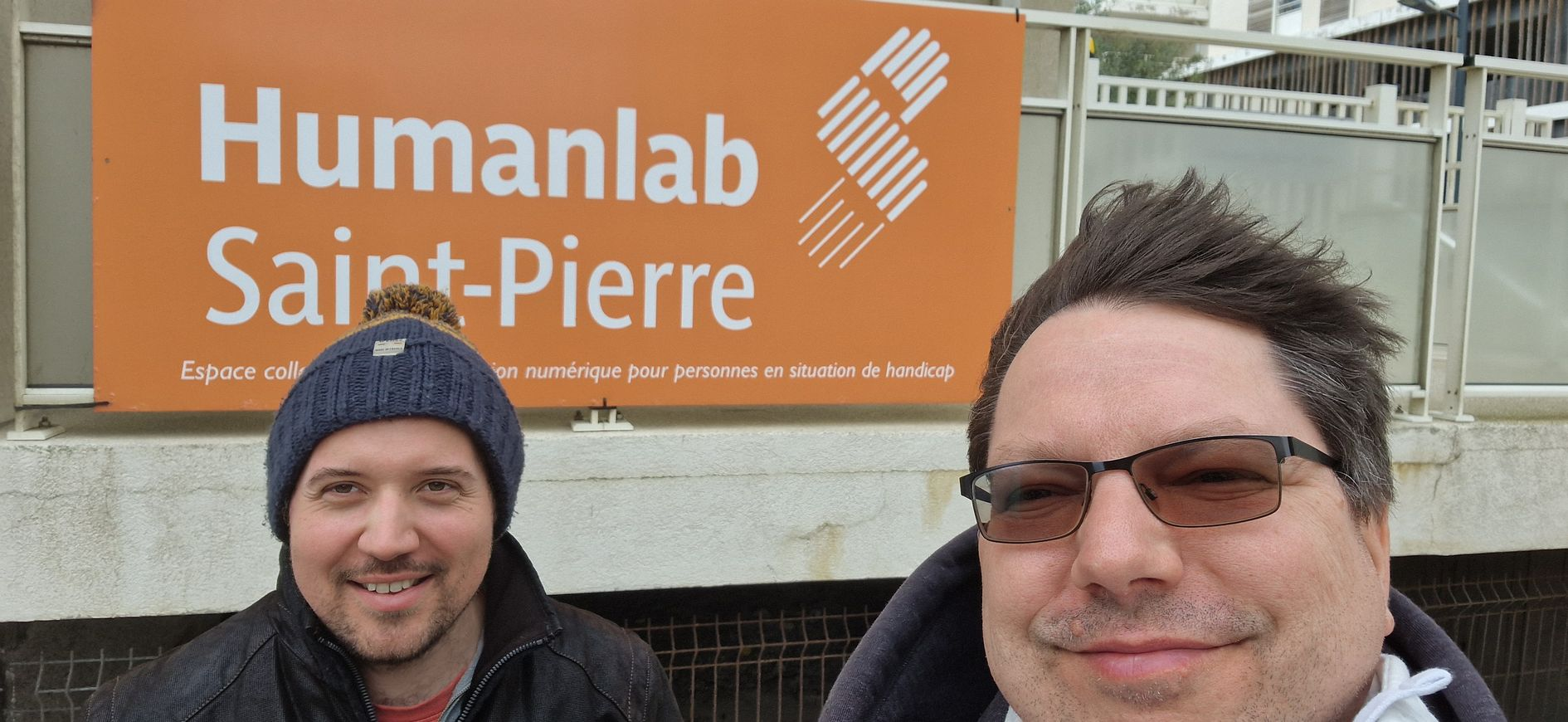
Journey back
On the way back to Germany (via Paris), I have to stop again in Clermont Ferrand to return the car. There are 2 more garages on the way.
AgoLab / Clermont Ferrand
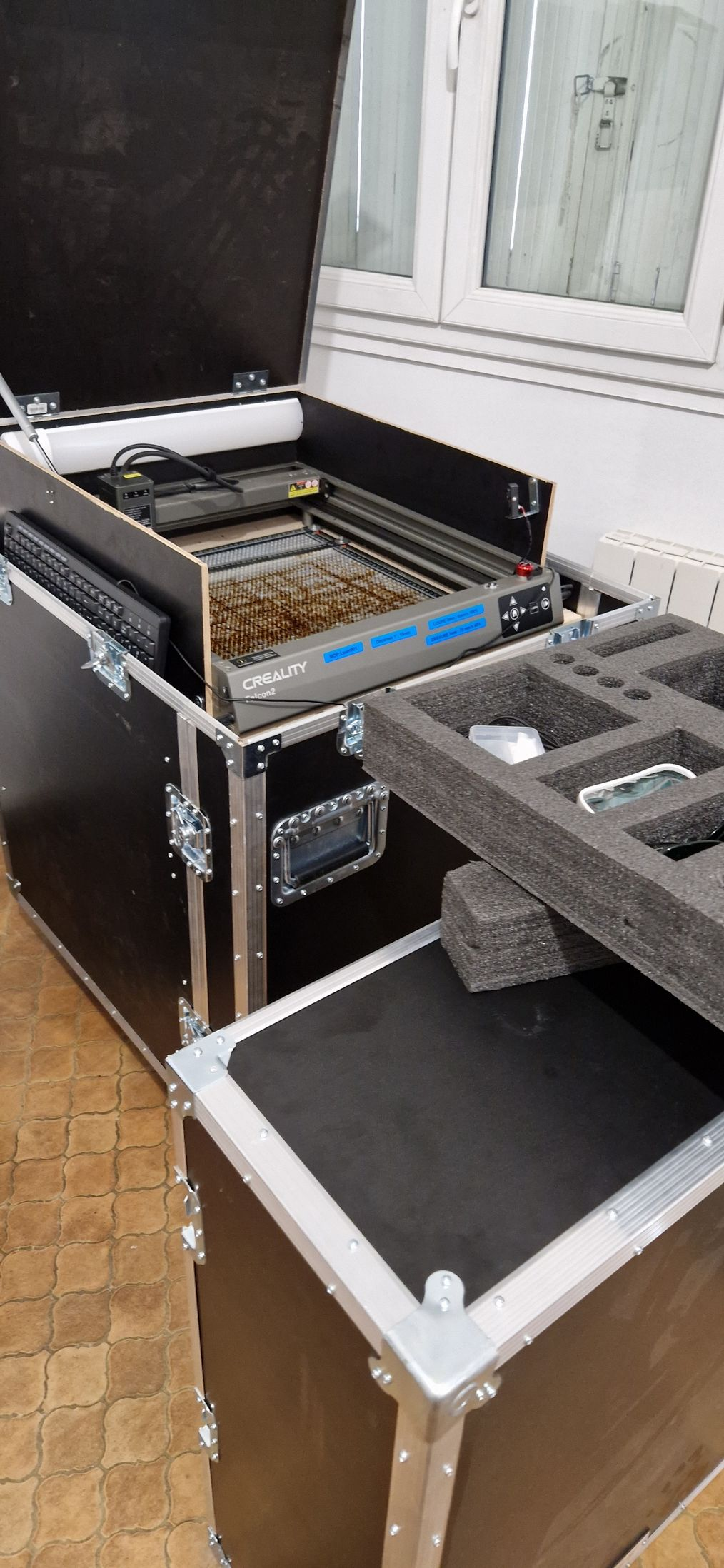
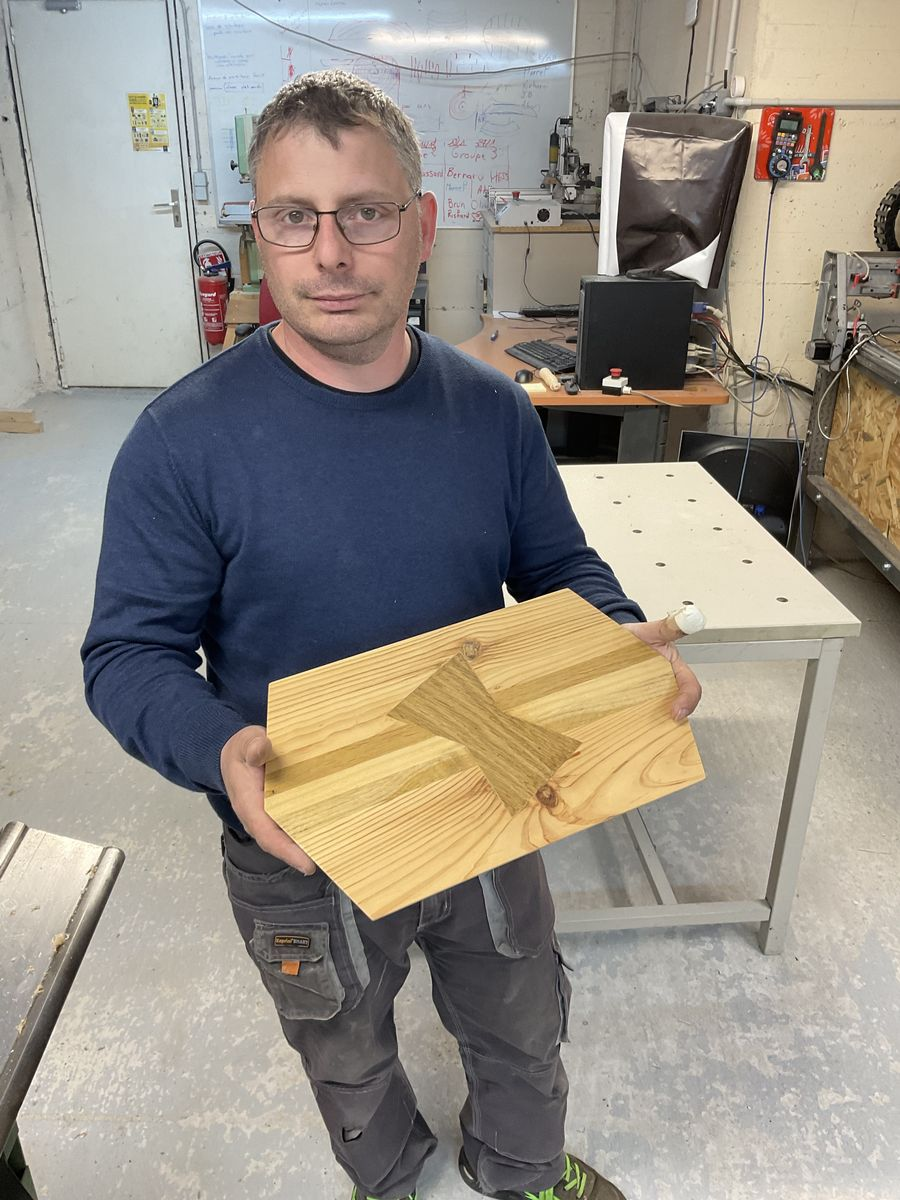
Gael likes to build flight cases for the Repair Café - so that the tools are well protected - when the repair crew moves around. I've also seen these boxes at the Repair Café at the Mountain Makers.
Mountain Makers / Manzat
Mountain Makers - This makerspace is located in the centre of the village, can only be reached by car and offers plenty of overnight accommodation - even for small groups. It's a great idea and is still being expanded. At the Lab & Workshop and also at the expansion: further accommodation for visitors (Maker Residencies) is to be created.
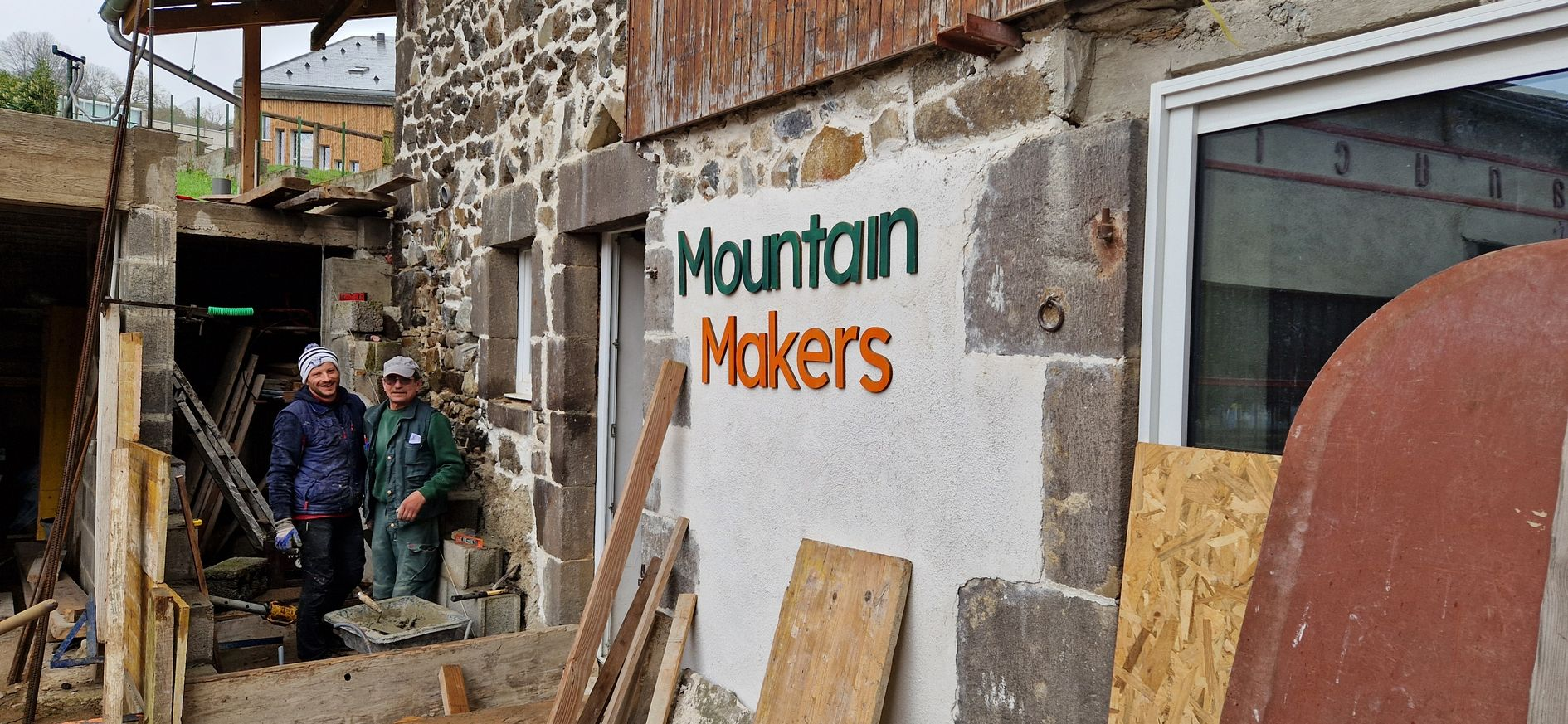
Fab03 / Varennes-sur-Allier
Finally, on the way back to Germany (via Paris), Mathieu is waiting with a 5000 m² playground (Fab03) in a former barracks. Probably the ‘fattest’ project on my journey.
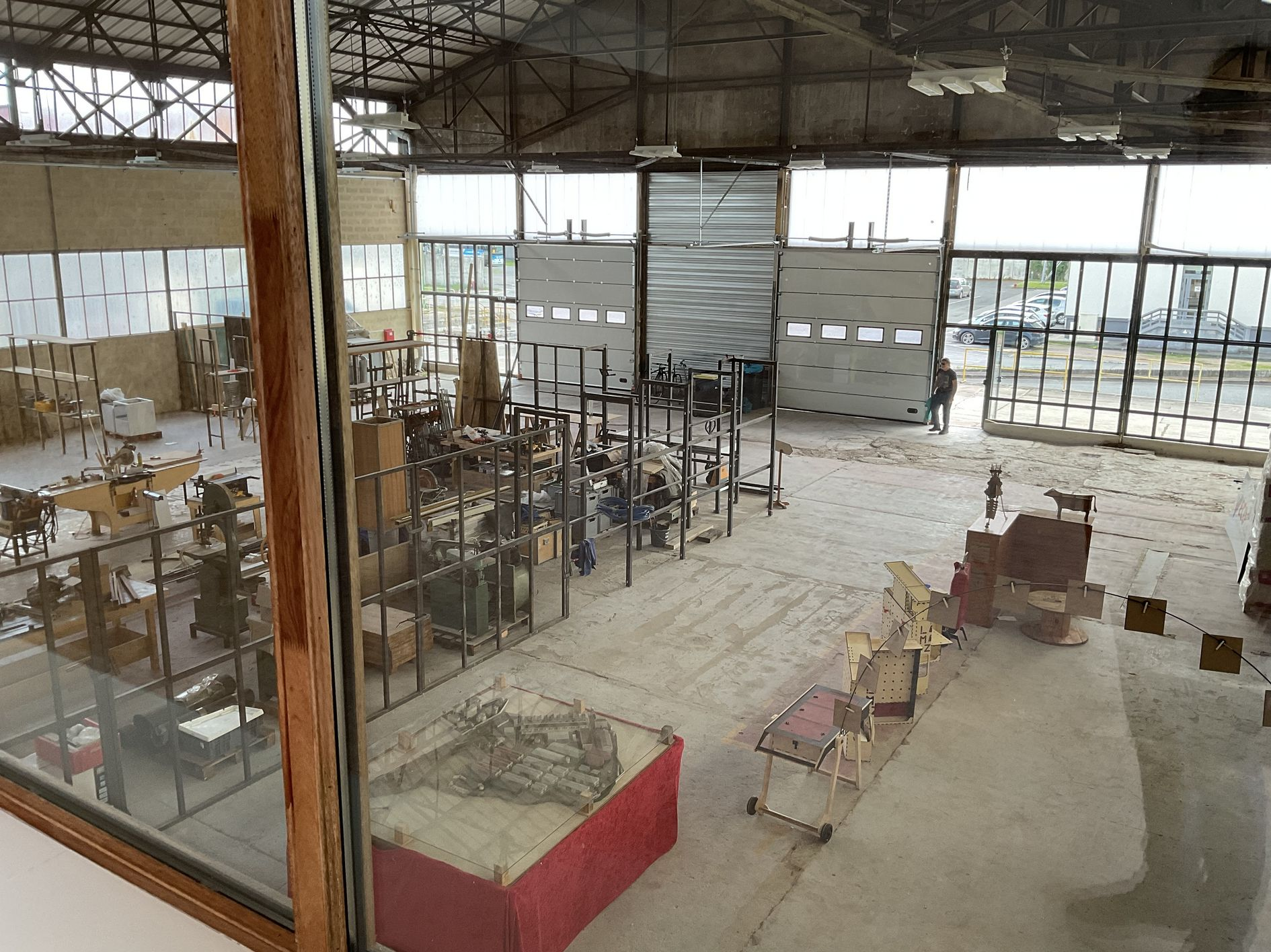
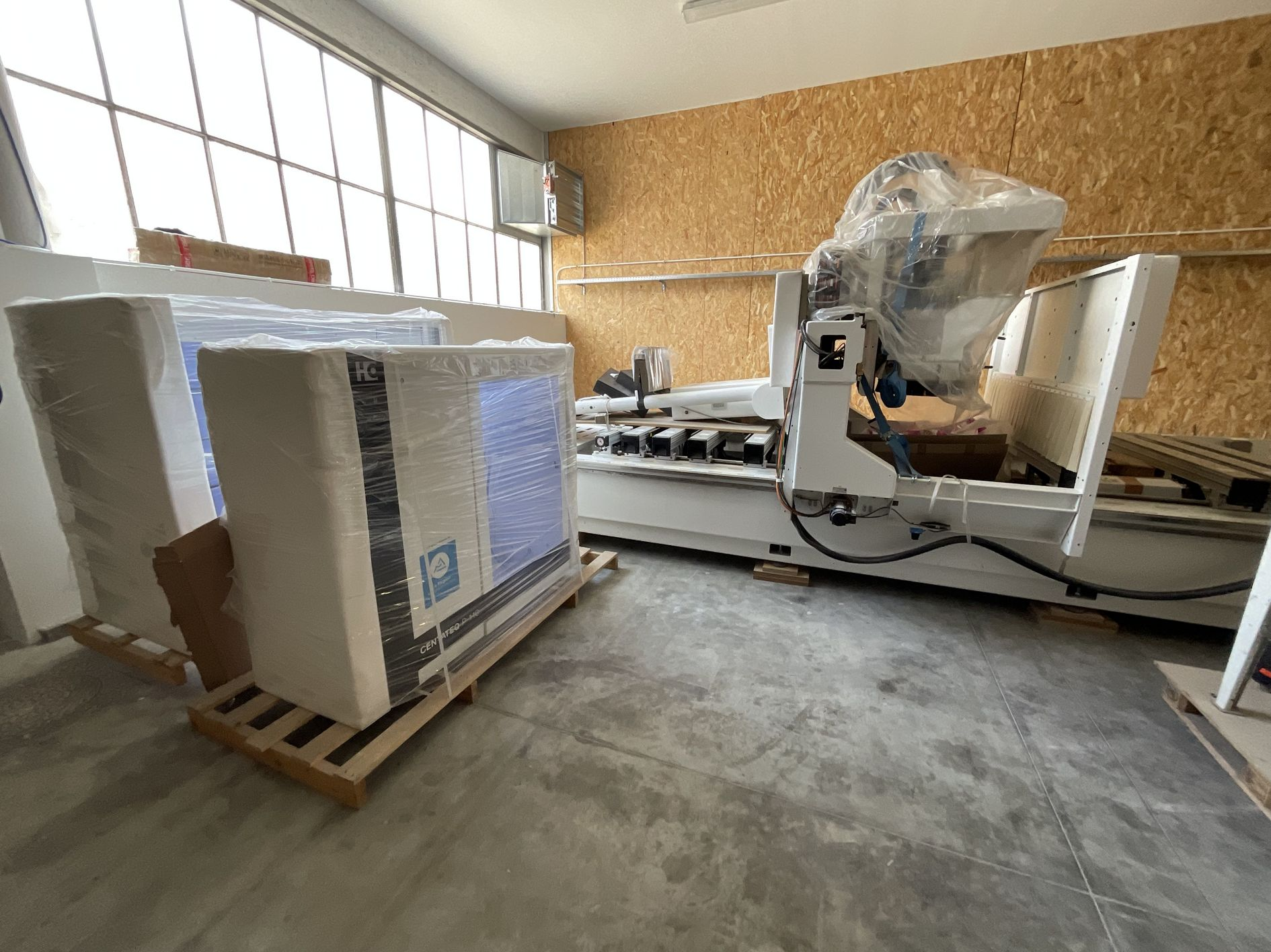
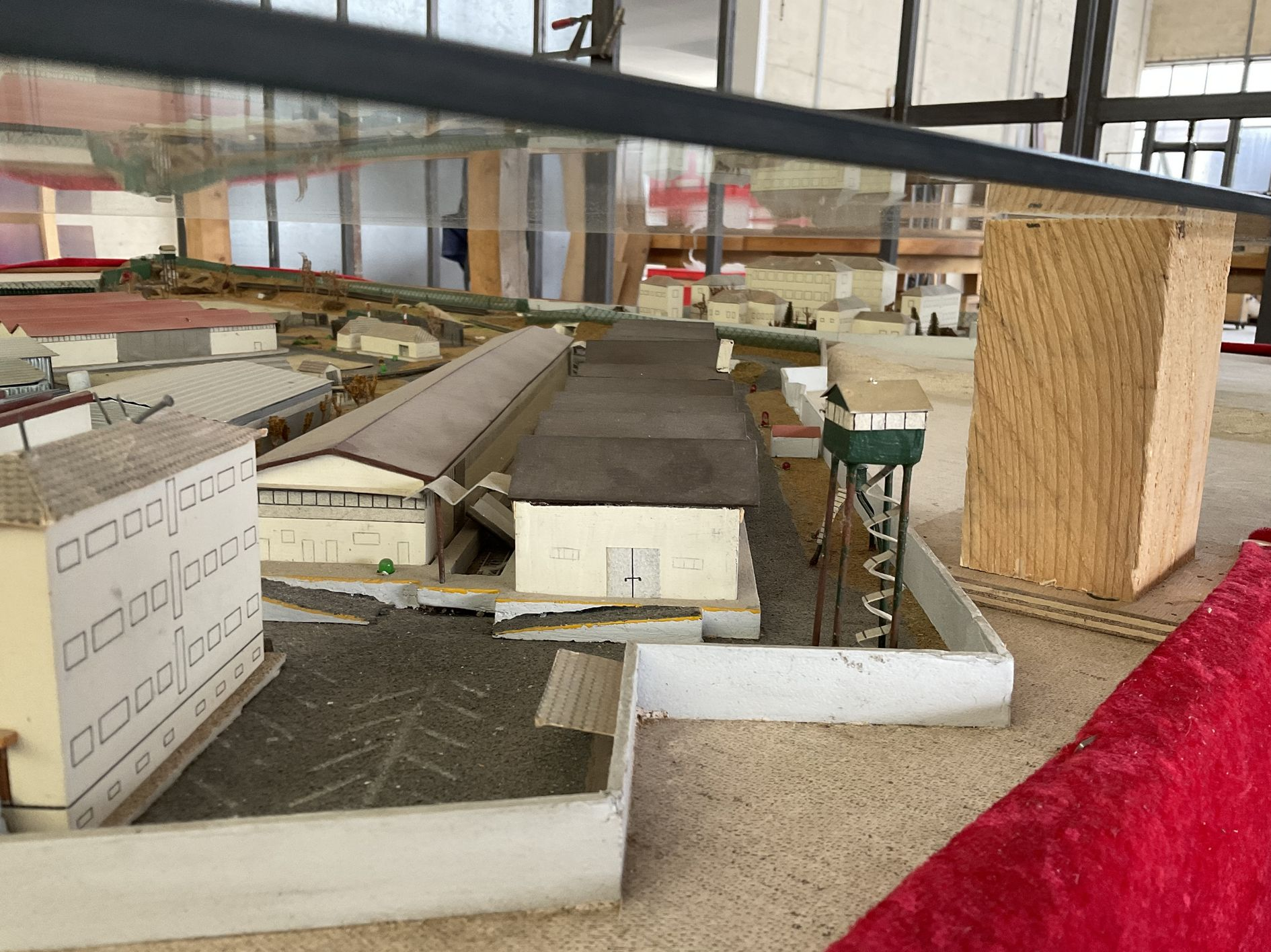
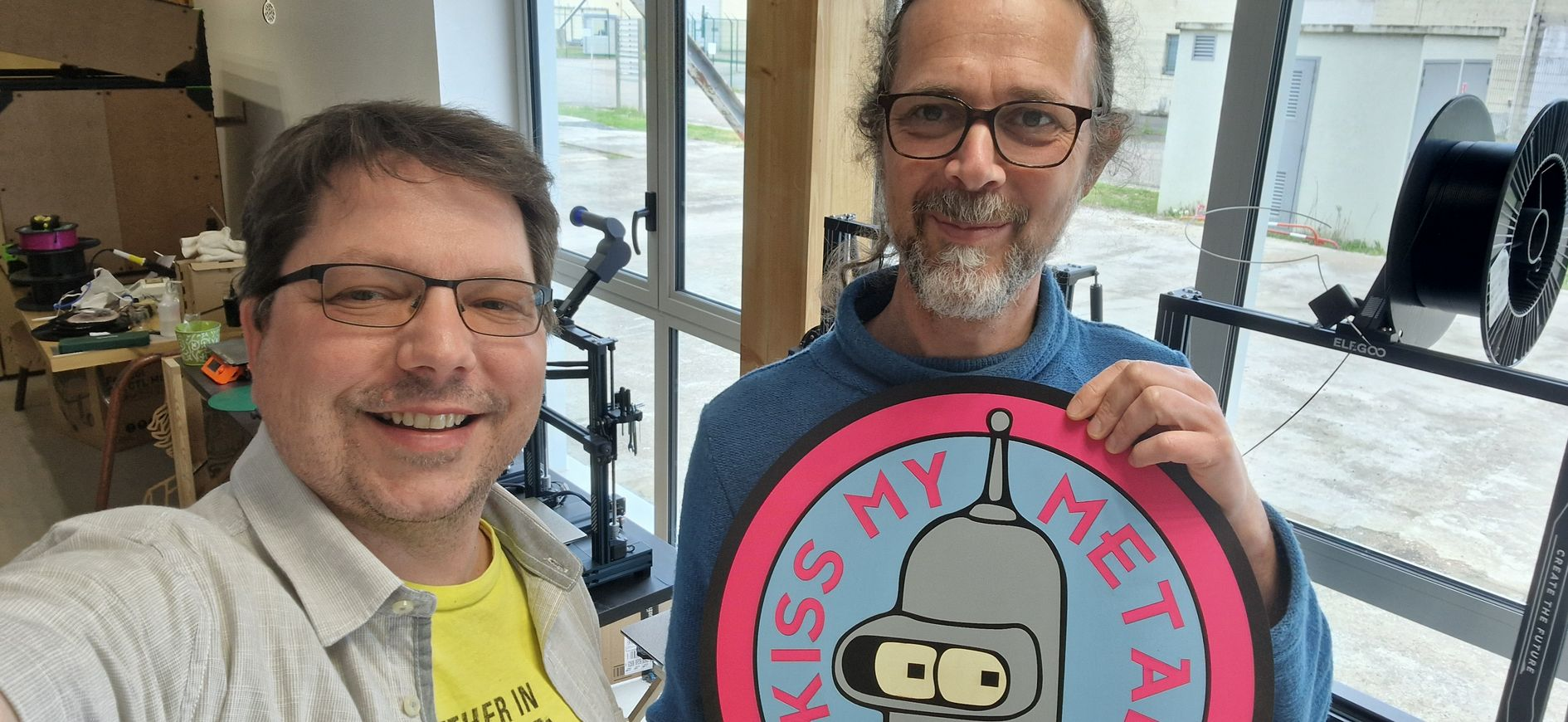
I say goodbye to France with a selfie with Mathieu and am grateful for many new impressions, mountains of input, especially on projects for and with people with disabilities or other limitations or complicated lives. There are lots of ideas for us in Saxony and also plenty of contacts for further dialogue. We will continue to process the collected input for you in various formats.
Conclusion
The challenge with the whole topic is the diversity and complexity. Everyone is different. Many people don't even know what they need or might need - but that's also the case for many consumers - so nothing new for makers ;)
Often a translation is needed between people and organisations, e.g. apf-francehandicap.org and the makers. Social interaction, emotional aspects, etc. play a major role. And you have to be able to handle that - it needs resources and both sides need time to adjust to it and to each other. This requires bridge builders. Ideally, people who are at home in both worlds.
What else is important! It's not primarily about building or delivering solutions, but about enabling access and participation, physically (buildings, rooms) but also in the mind, language and, I'll call it ‘welcoming’, which in our hectic times (in my view) means one thing above all: taking time for someone. But from my observations, this is often difficult even for those affected.
Support / funding
The project is being supported by the Franco-German Citizens' Fund (Fonds Citoyen Franco-Allemand) from April to July 2025. Our supporters and companions are the French partner network RFF Labs, the German umbrella organization Verbund Offener Werkstätten e.V. and the European Vulca organization for international relations between open workshops (aka makerspaces), of which we are also a member.
We are grateful for the financial support and the great network exchange, which was already possible a few months before the trip thanks to the commitment of many people, especially RFF Labs and VULCA.

Last but not least, a clip about the Fonds Citoyen Franco-Allemand:
Thanks also to Axel from the Zentrum für Austausch und Machen (ZAM) and the Industrieverein Sachsen 1828 e.V. for providing tips for the Sachsenlotto “Möglichmacher” campaign. Part of the funds will go towards this project.

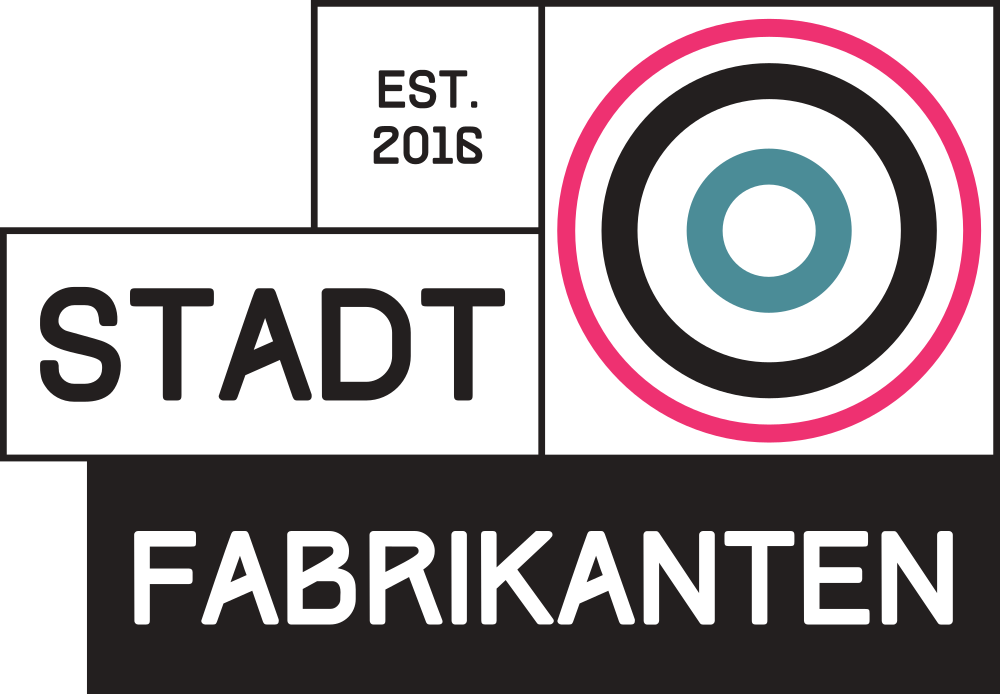
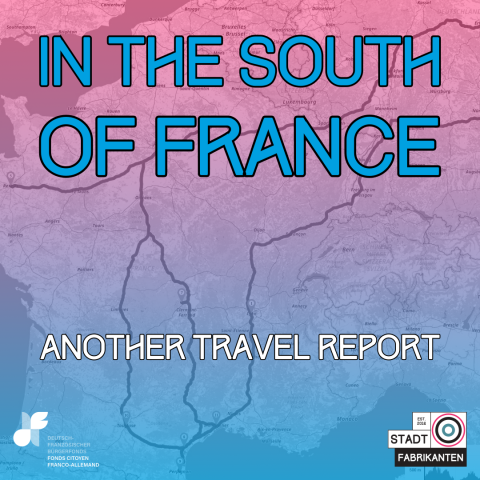
Comments